“A hard working rock band on the road”
Source: Broadcast Barnsley (Credit John Cruse with kind permission, Jan 4, 2019)
Back to our chosen theme: as Melvin Bragg said in his preamble to the BBC’s ‘Second house’ film on the Kursaal Flyers, the life depicted is ‘seedy, gritty, tough and unattractive.’ Nevertheless, that has been the route by which many bands have risen to stardom. It was certainly the case for Barnsley heroes Son of a Bitch/ Saxon, as described in an article in the Barnsley Chronicle in November 1977.
Reporter Stephen Thorpe went on tour with the band and described to local readers the hard grind of life on the road, a relentless and often unrewarding slog that tested all but the most committed. Biff, the band’s vocalist, had the belief necessary to fight through. He told the paper:
“We’re going to make it and make records; there are no two ways about that. If we don’t believe in that, we might as well pack it in.”
He was proved to be perfectly right, but you had to have immense faith at the height of the punk movement to carry on playing out-moded heavy metal.
Conditions on the road were gruelling and sapping. The band had problems with the power supply at several of the venues. Cancelled gigs threatened their entire budget potentially: they might expect to make £50 in an evening (£340 today) but the profit was often less. The band relied on the money made at one gig to pay for petrol to get them to the next. A lost date could have caused the entire tour schedule to collapse.
The group allowed themselves £1 a day (about £7 currently) to cover their personal expenses- food, cigarettes etc. Sometimes, though, there was no cash to buy a meal before a gig and the often went on stage making do with just a cup of tea. During the interview the band praised their invaluable sixth member, the roadie John Batty. His devotion was a key part of Son of a Bitch’s survival and success.
Source: Broadcast Barnsley, May 4, 2017
In January 1976 Metro Management advertised that “out of the ashes” of the previous bands had come a new Son of a Bitch, who were booked to play their first gig at a small civic venue, the Centenary Rooms, on February 6th 1976. The choice of venue indicates that they were still unsure of their audience, but the band members all had solid live experience and they were confident enough to return within a month (with Fix as support), albeit for only 50p (now about £3.80) on the door. Aged 15, I first saw the band playing at one of these two gigs- I have forgotten which, but it was my first experience of live rock and I remember it as being packed with grown-ups and being smoky, beery and very loud! It felt like my first taste of an exciting, adult world.
The band played their home town regularly after that, although they graduated to the main auditorium of the Civic Hall from June 1976, playing a gig that promised to “make your feet steam” for a mere 65p.
The band appeared in Barnsley nine times over the next thirty nine months. This averages one appearance every three months or so, but in fact five of those gigs were during the first year. It seems apparent that the strategy was to establish a core local audience and to hone the group’s live skills and set at minimal expense, before gambling time and resources on unknown audiences further afield.
Bitch were hungry for public exposure as well as live experience and accordingly they agreed some odd appearances and pairings. Usually the band were supported by other local rock outfits- for example, in November 20 (1976) support was provided by Heaven’s Above from Cudworth and Weasel from Mexborough. This was not always the case, however. In July 1976 Bitch again played Barnsley’s Civic Hall, this time (bizarrely) as part of the borough’s ‘Youth Dance Week’. Support surprisingly came from Manchester’s Afro-Caribbean soul band Masterpiece; on another occasion Bitch were supported by a white soul outfit, Kokomo, and at another gig films were shown instead of a live guest act, one being of a live performance by avant garde experimentalist Eno.
The local paper, the Barnsley Chronicle, announced that the July gig proved that “rock lives” (in the face of the birth of punk, presumably). Bitch, “arguably Barnsley’s foremost rock band,” had played to an audience of 300 and had provoked “wild scenes, pandemonium, chaos and cheers.” The report listed the set- it included Freeway, Lift up your eyes, Easy, Taking in the dollar and longstanding favourite Bap shoo ap. The favourite that night, though, was a ballad called Anne Marie. I recall this song, even today. It was a certainly a fave of me and my friends who were in attendance that evening and- at a push- I think I could still play the opening riff, even after four decades.
When the band returned again in November that year the paper declared them to be “possibly the town’s leading band at the moment” and “well on their way to ‘making it’” as they had just distributed demo tapes to record labels. It was, however, to be another two years before Bitch finally found a recording contract.
You can trace the band’s steadily rising profile directly through the pages of the Chronicle. SoB (as the reporters discretely liked to call them) were a local success story the paper was happy to feature, whilst the band plainly recognised the benefits of guaranteed press coverage. Today, acts can promote themselves directly to fans through Facebook, Bandcamp and the like. During the seventies you had to work harder for publicity, but the local paper was very willing to fill column inches with praise.
Another route to recognition, now as then, was through competitions. In late September 1977 Bitch won a local ‘battle of the bands’ heat in Sheffield and were headed for the semi-finals of the US Sound Spectacular in Manchester in October. Perhaps to capitalise on this success, another Barnsley gig was announced and the band set about recording further demo tapes. Nonetheless, it must have been galling and dispiriting for them to see brand new punk outfits getting signed within months of forming whilst SoB– despite their considerable musical and live experience- were still gigging around the working men’s clubs and hunting for a deal.
The November 1977 booking was put in doubt by an event at the same venue in late October. Barnsley’s one and only punk gig ended in an alleged riot and a police raid. In response, a review of the council’s bookings policy was initiated and SoB were caught by this over-reaction. As vocalist Pete Byford told the Chronicle, the “antics of the punk rockers” had threatened all live performances in the town and, before the concert could proceed, the band had been obliged to provide legal undertakings to pay compensation for any damage wrought by the audience. As it was, the gig passed off peacefully, perhaps because the heavy metal fans restricted themselves to drinking Barnsley Bitter and head-banging rather than pogoing…
In mid-1978 the Chronicle announced that SoB had finally secured a recording contract. They had been flown over to Paris to sign a five figure deal with Carrere Records and were to begin recording their first album in the near future. Everything seemed promising: in mid-September the local paper reported that the album would be released by Christmas. That said, it had no title, as yet, and there was also talk of the band changing its name too.
A triumphal return to Barnsley Civic Hall took place in December 1978. This gig is memorable for two reasons: firstly, we learned that, like Tony Iommi, the lead guitarist had nearly severed the tip of his left index finger, imperilling his ability to play; thankfully he was still able to riff and solo as well as he had ever done.
Secondly, and most significantly, Biff, the vocalist, told us that the band had signed a record contract (roar of approval) BUT that the record company had insisted that they change their name (boos- but perhaps not altogether surprising in the circumstances). From thenceforth they were to be known as Saxon, but (Biff assured us) to the loyal fans of Barnsley they would always be Son of a Bitch. For many of us in the audience, there was a sense that this success was cursed. It had been endangered by the guitarist’s injury whilst it had been bought (it seemed) at the price of their true identity.
In fact, (with shades of Spinal Tap) the appearance of the new album was further delayed- doubtless in part because of the name issue. Recording took place at in Barnet, between January and March 1979, and the album ‘Saxon’ was eventually released on May 21st of that year.
Source: Peter Lindblad
SOAB – The early years
Dodging flying beer bottles and sidestepping brawling hooligans isn’t everybody’s idea of fun. Biff Byford and the boys of Son of a Bitch, precursors to the New Wave of British Heavy Metal legends Saxon, always found trouble in one particular live venue in the northeast of England – in the industrial town of Burnley – called the Bank Hall Miners Club, but that didn’t stop them from playing there as often as they could in the early days. As the lanky Saxon front man recalls, “The money was good.” And it had to be, because there was a real possibility that one or all of them could wind up in the hospital after the gig. “It was a club for miners, as the miners had their own club,” says Byford. “That was pretty hard actually. That was a pretty hard place. There used to be fights there every time we played – not because of the band, but because there were two gangs that used to stand across each side of the room looking at each other, and then at some point, they’d all charge at each other and that would be the end of the concert. So yeah, it was a bit rough. It was like ‘The Blues Brothers,’ where they’re throwing pots and bits of beer at the band and things.”
Even for young men craving rock ‘n’ roll excitement and even danger, the violence of the Bank Hall Miners Club in the late 1970s was a bit much for Byford and Son of a Bitch. They had to make a buck, though. And, regardless of the trials and tribulations of barnstorming England in a cramped van and performing at clubs and bars where many of the patrons might want to take a swing at them, it beat the hell out of working in the mines.
“When I was 17 or 18, I was working in the coal mines,” says Byford. “It was difficult. It was really hard work. When you’re that young, you’ve got mates in there, and I wasn’t in there for very long. It was a dangerous place. But, yeah, I know what it’s like to work hard for everything.”
Perhaps that’s why Son of a Bitch, and later Saxon, originally had such a large following in working-class communities in the north of England and in South Wales, landscapes once dominated by factories and “cut off from the south,” the more pastoral area of Britain, as Byford says.
“I suppose people just wanted to go out on a Friday or Saturday night and have a great time and just watch a great band,” says Byford. “All these little villages or towns had clubs or bars, and we used to play them. You could play one every night for a month. And that’s what we did.” Back in the 1970s, Byford only had to witness the tough lives of his fellow miners to give himself the push he needed to make it as a musician.
Late 1975, Byford, guitarists Quinn and Graham Oliver, bassist Steve “Dobby” Dawson and drummer John Walker – who would soon be replaced by Pete Gill – formed what would become Saxon in Barnsley, South Yorkshire, only they started out as Son of a Bitch. They toured England relentlessly, as is recounted in the 2012 Saxon documentary film “Heavy Metal Thunder.” The venues weren’t exactly posh settings.
“We played a lot of clubs and bars,” says Byford. “Yeah, we thought it was great fun, although they were very rough. There were a lot of fights and things.” Part of the excitement involved having copious amounts of sex with groupies in the band’s van – which also housed their gear – after a gig. Their one-night stands occasionally got them into hot water. “You had to have a good pair of running shoes to get out of the way,” jokes Byford. “There was always somebody’s girlfriend that liked one of the band members, and you had to get out pretty quickly.”
While the U.K. club circuit provided Saxon, who ditched the name Son of a Bitch fairly early on, all the thrills and excitement they could stand, they had bigger dreams. And they had no intention of being just a covers band, which only served to rile audiences. “In the early days, we used to do like three sets,” recalls Byford. “We used to stop and have a break and then start again. And usually by the end of the set, all of them were pretty rough actually. And we really didn’t do cover songs back then. So a lot of people used to ask for ‘Smoke on the Water’ and all (laughs). And we said, ‘We don’t play that.’ And then they’d usually riot, you know what I mean? After a while, people would come to see us because we were a good band then, so we actually got on a little bit easier as time went on.”
John Walker (first drummer SOAB, Nov 75 – Jan 77)
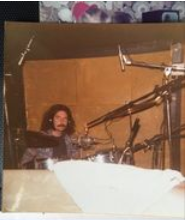
Early SOB recording with John Walker on drums
Pre-79 Recordings “Son Of A Bitch”
Demo recorded early 76 “Tapestry Sessions”
Tracks: Freeway Mad, Still Fit to Rock n Roll, Big Teaser, Ain’t you Glad to be Alive
Radio Luxemburg session recorded 78 (These demo’s are included on the Diamonds and Nuggets album)
Tracks: Freeway Mad, See the Light Shining, Street Fighting Gang, Ann Marie, Lift Up your Eyes

Demo recorded 78
Tracks: Big Teaser, Stallions of the Highway, Backs to the Wall, Rainbow Theme, Frozen Rainbow
Demo recorded 78
Tracks: Big Teaser, Rainbow theme, Frozen Rainbow, Stallions of the Highway, Militia Guard

Boilermakers Arms, Sunderland 20-01-78 1st set
Recordings by Brian Potts with kinder permission
Tracks: Stallions Of The Highway, Judgement Day, Frozen Rainbow, Big Teaser, Taking In The Dollar, Anne Marie, Freeway
Boilermakers Arms, Sunderland 20-01-78 2nd set
Recordings by Brian Potts with kinder permission
Tracks: Lift Up Your Eyes, Still Fit To Boogie, Lazy Days, Johnny B Goode, Bop Shoo Wap, Backs To The Wall, Street Fighting Gang, Easy, Glad To Be Alive, Frozen Rainbow
Formation of SOAB
End November 1975, some true historic event
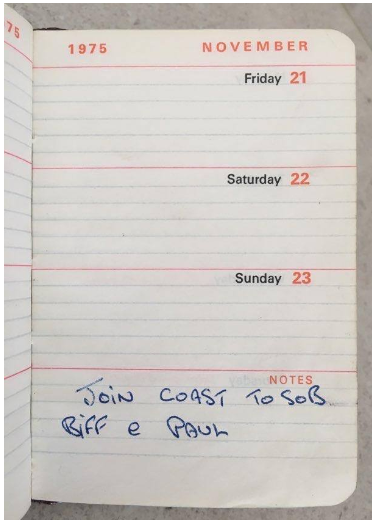
Son Of A Bitch (Nov 75 – Jan 77):
Peter Byford (voc)
Paul Quinn (gtr)
Graham Oliver (gtr)
Steve Dawson (bass)
John Walker (drms)
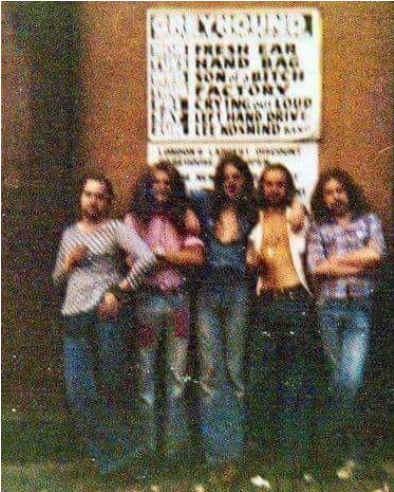
Son Of A Bitch (Jan 77 – Dec 78):
Peter Byford (voc)
Paul Quinn (gtr)
Graham Oliver (gtr)
Steve Dawson (bass)
Peter Gill (drms)
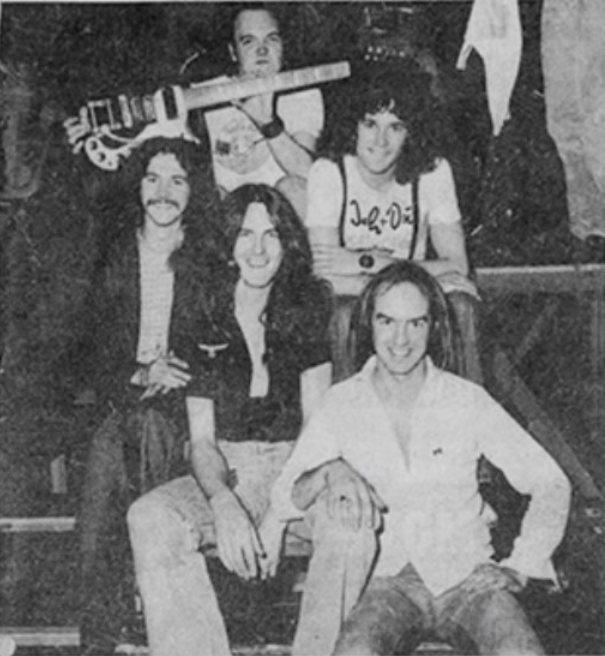
*** A: Concerts with exact dates and venues (1976 – 1978) ***
SOAB 1975, Dec: Dickens lnn, Rotherham. First session jammed around Christmas
Venue
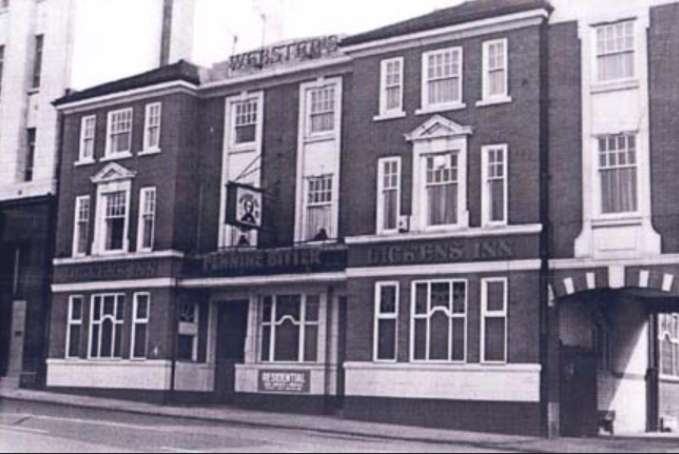
SOAB 1976, February 6: Small Civic venue, the Centenary Rooms, Barnsley, England UK (first SOAB concert)
In January 1976 Metro Management advertised that “out of the ashes” of the previous bands had come a new Son of a Bitch, who were booked to play their first gig at a small civic venue, the Centenary Rooms, on February 6th 1976. The choice of venue indicates that they were still unsure of their audience, but the band members all had solid live experience and they were confident enough to return within a month (with Fix as support), albeit for only 50p (now about £3.80) on the door. Source: Broadcast Barnsley, be Bop Deluxe, 4 May 2017
Venue
The Centenary Rooms were/ are a venue on the top floor of the Civic Hall. The Civic was a large auditorium with a balcony and capacity for 800; the Centenary Rooms (now called the Assembly Rooms) was, basically, a long low room with a separate bar/ lounge on one side. The Centenary Room stage was quite small and once you had a drum kit, amplifiers and PA set up, it was a tight squeeze. The Civic stage was vast; you felt lost on it.
SOAB 1976, March 5: Small civic venue, the Centenary Rooms, Barnsley, England UK
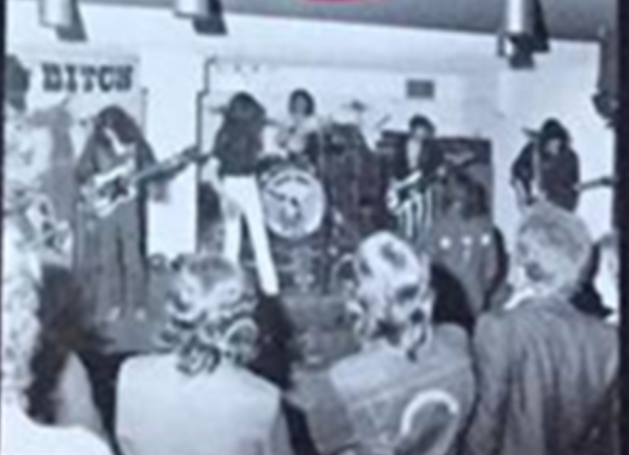
SOAB 1976, May 13: The Nashville Rooms, London, Kensington (With Cafe Society)

Venue
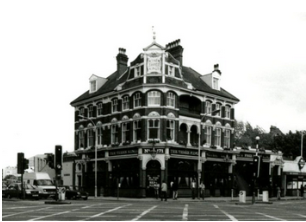

Location: The Eagle Child pub in Conisburgh somewhere around 1977 (source Graham Oliver)
SOAB 1976, May 23: Boat Club, Nottingham England
Source: Punk Music Catalogue
Venue
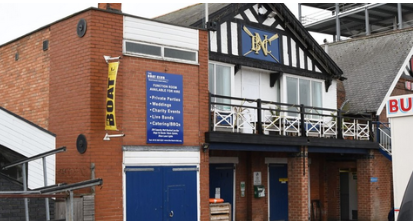
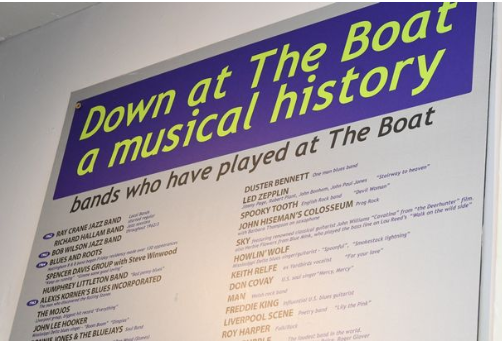
SOAB 1976, July 11: Boat Club, Nottingham England
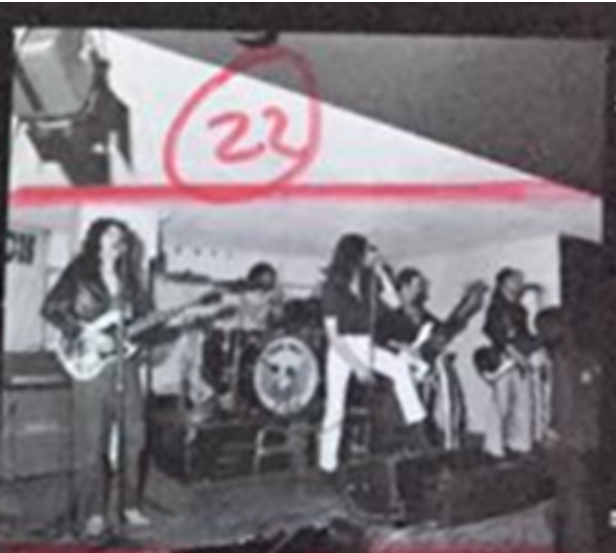
Source: Punk Music Catalogue
Venue
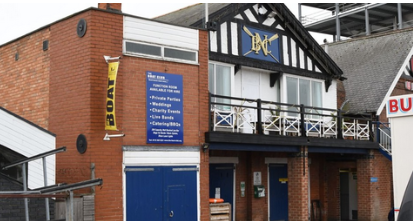
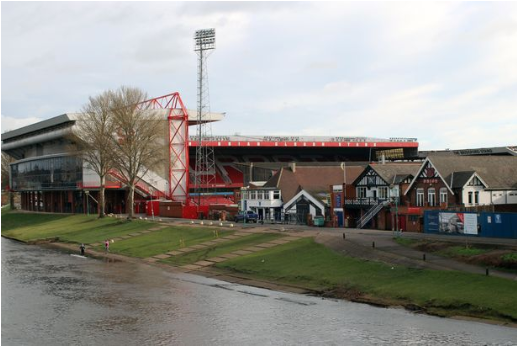
SOAB 1976, Jun 4: Civic Hall, Barnsley, England UK
Venue
SOAB: 1976, July 17: Barnsley Civic Hall, England UK
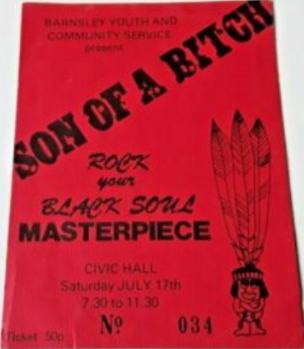
Venue
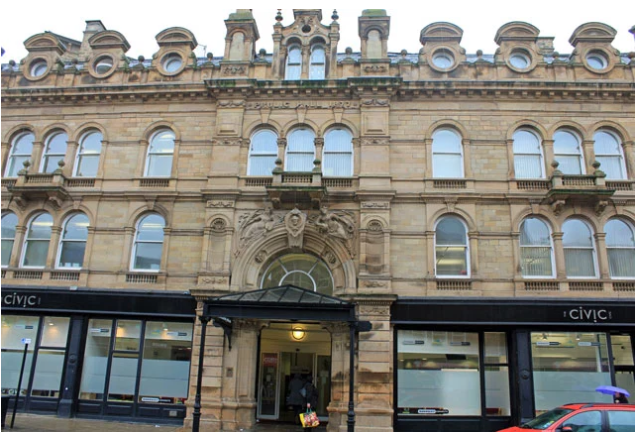
SOAB 1976, September 3: George Hotel, Alfreton, Derbyshire

Venue
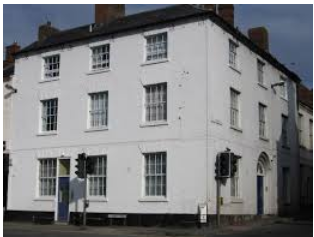
SOAB 1976, Nov 20: Barnsley Civic Hall, Barnsley England UK
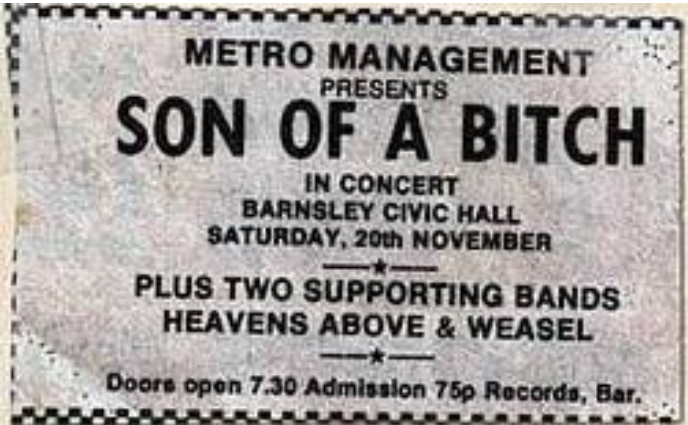
Venue

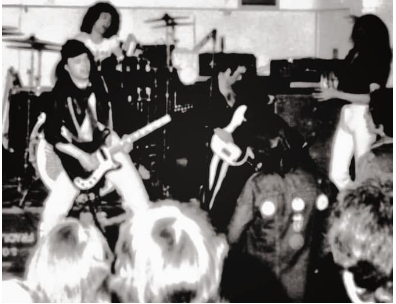
SOAB 1976, Dec 1: Adam & Eve, Chesterfield (Probably last concert of John Walker with SOAB)
John Walker, onetime SOB And SOAB drummer, was from Chesterfield and lived just around the corner from the Adam & Eve (source Chris Drew).
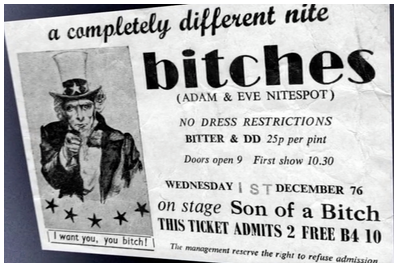
Venue
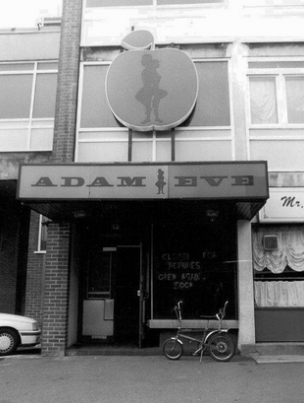
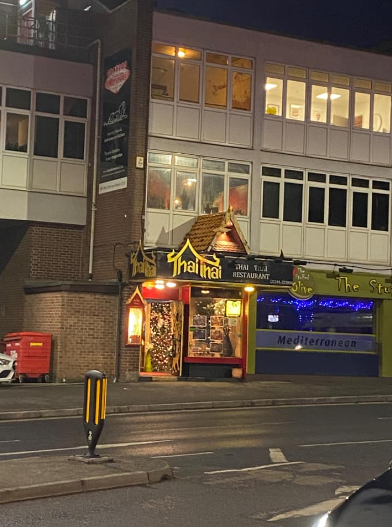
Opening of concert
They used to start with some Tangerine Dream’s ‘Phaedra’ over the PA and as a crescendo built they would start up. Great band, very exciting. Reminiscent of Free but it was a long time ago. Very unusual for them to be at the Adam and Eve club. Source information: Bob Lockett.
SOAB 1977, August 11: Princeville Club, Bradford
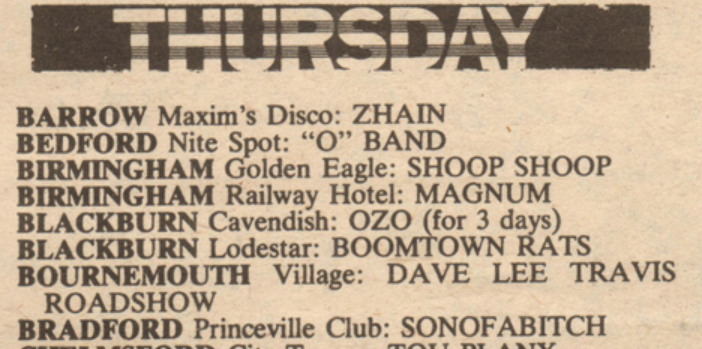
Venue
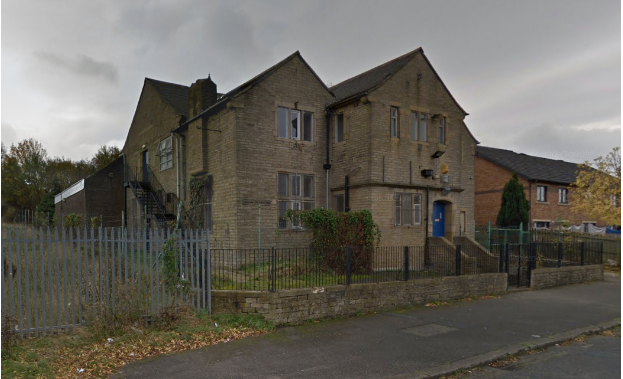
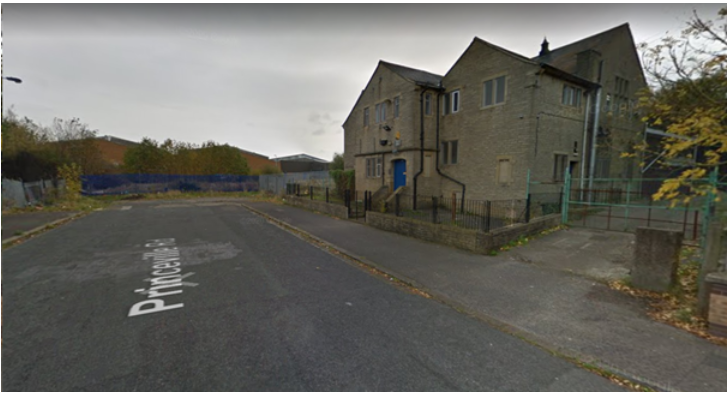
SOAB 1977, August 14: Fforde Grene Hotel, Leeds
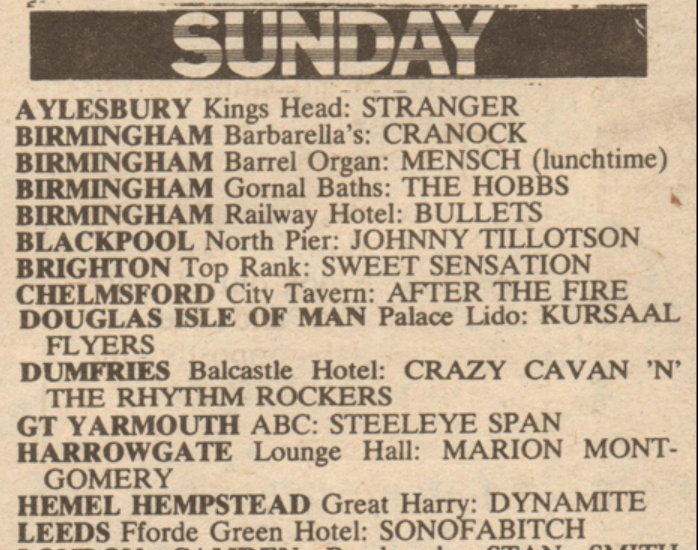
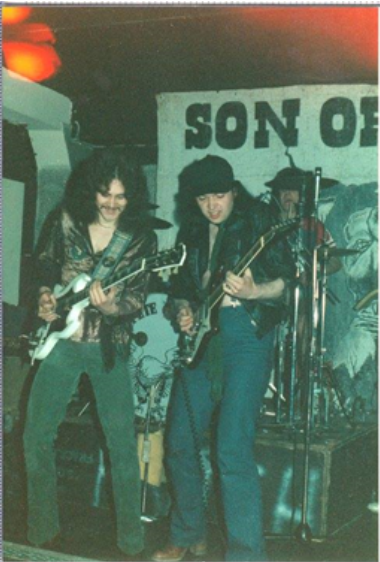
Venue

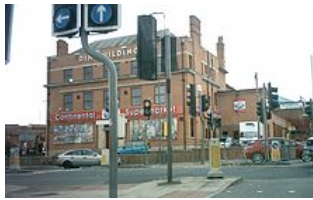
SOAB, 1977, September 16: Top Rank Suite, Cardiff (supporting Heavy Metal Kids)

Set list
Unknown, set list wanted
Venue
SOAB 1977, September 17: Pawlett Manor Hotel, Bridgewater
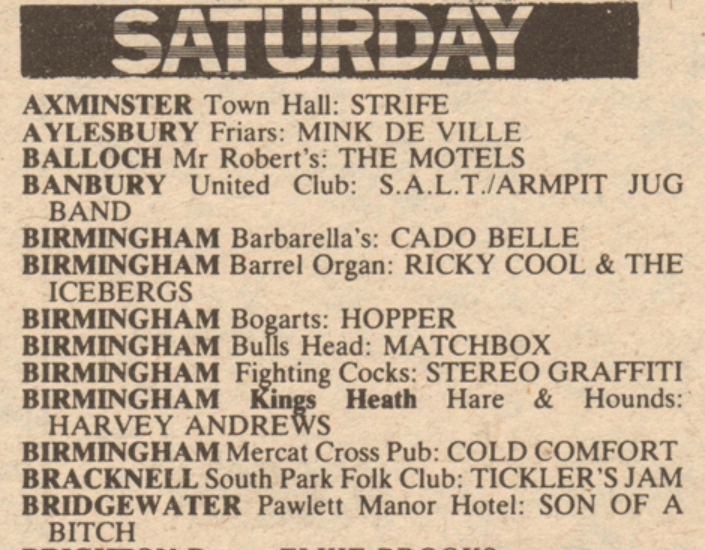
Venue
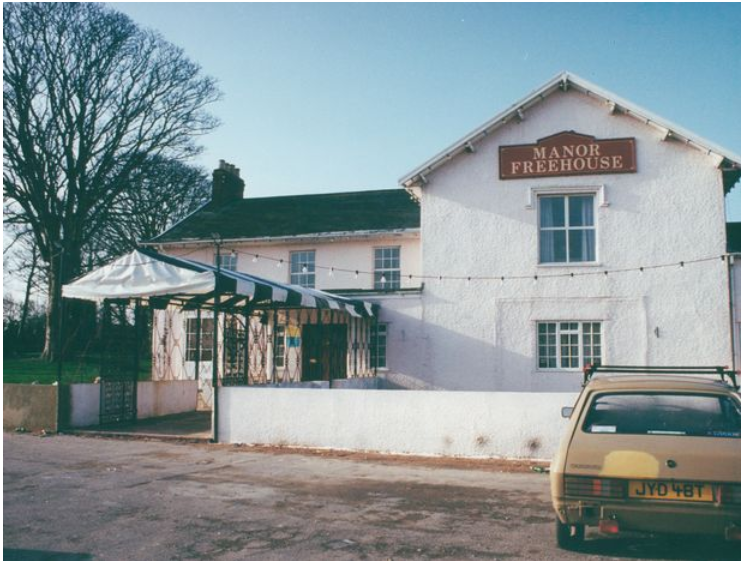
SOAB 1977, September 11: Sheffield Top rank, England UK
Late september 1977, they were in the US talent competition won that heat and played a gig at Manchester with Ian Gillan but came second as a band called Marseilles win the final

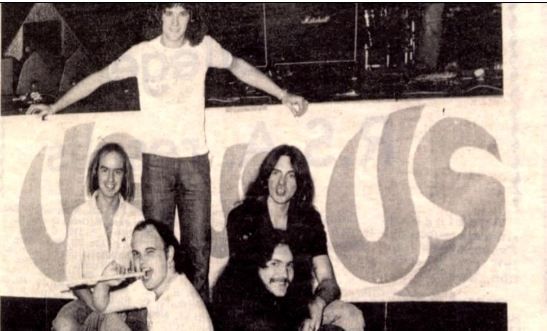
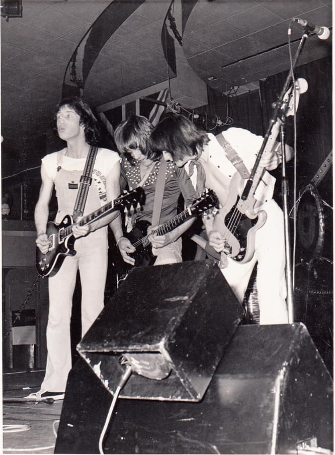
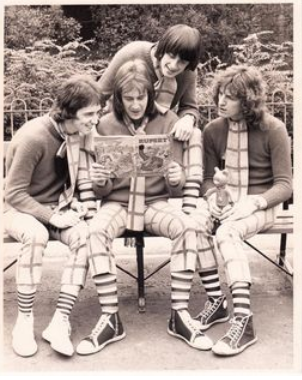
SOAB 1977, October 6: Granary, Bristol
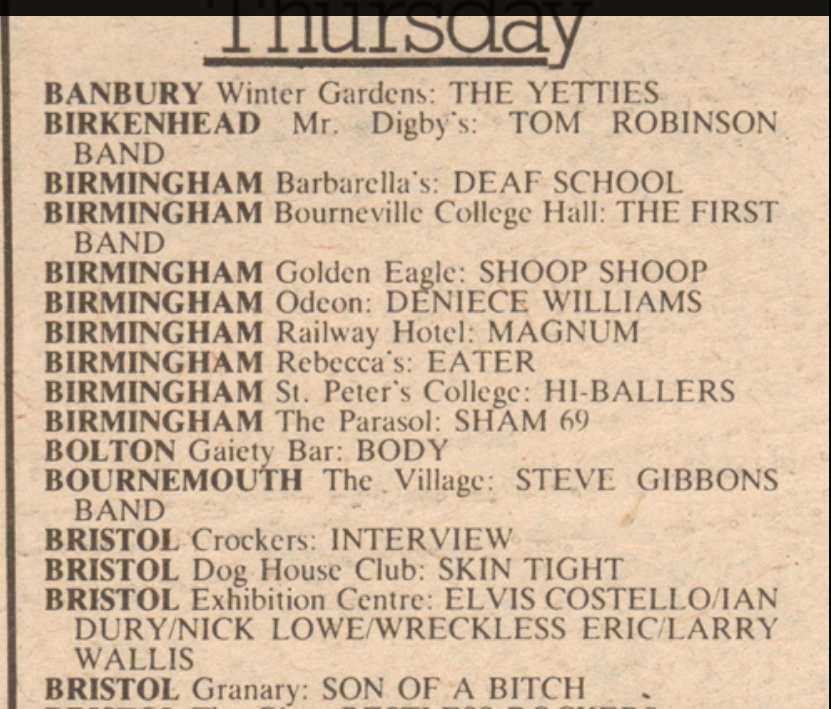
Venue
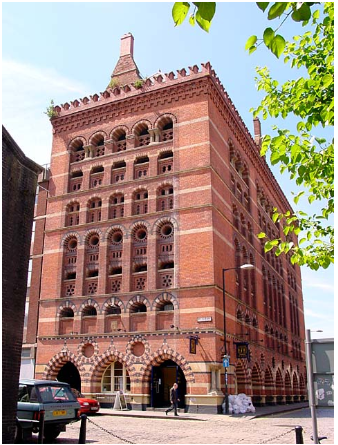
SOAB 1977, October 7: The Apollo, Manchester, England (Supporting Ian Gillan Band)
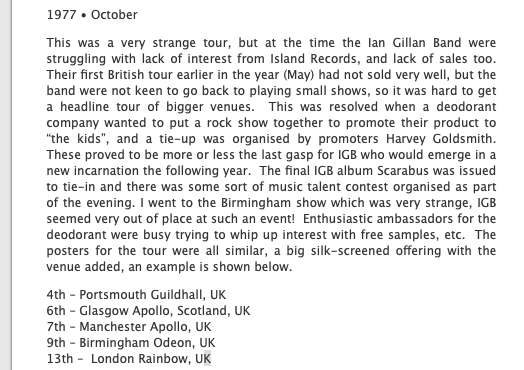
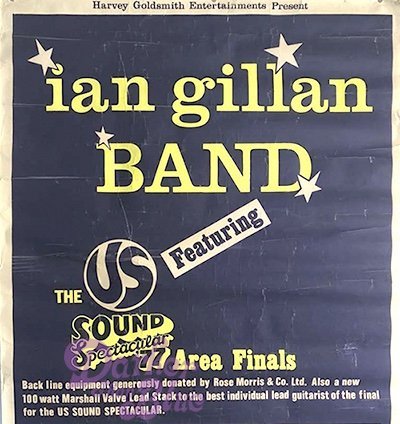
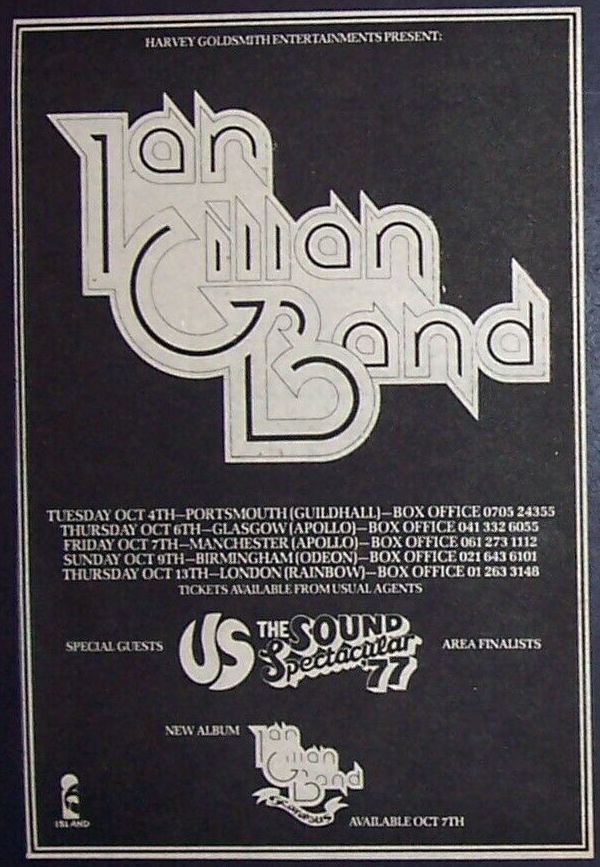
Venue
SOAB 1977, October 8: Arrail Street Club, Abertillery

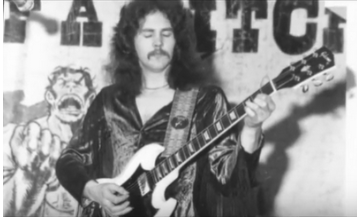
Venue
Not sure if the picture below is the Arrail Street Club
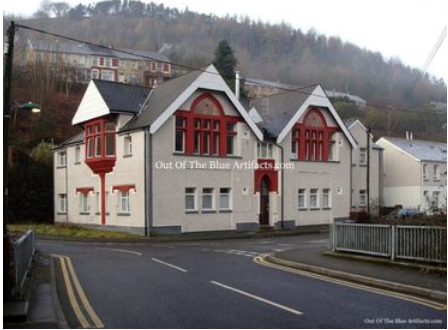
SOAB 1977, October 13: Dixieland Showbar, Southport

Venue
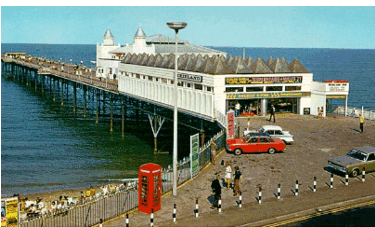
SOAB 1977, October 28: The Centenary Rooms, Barnsley, England UK
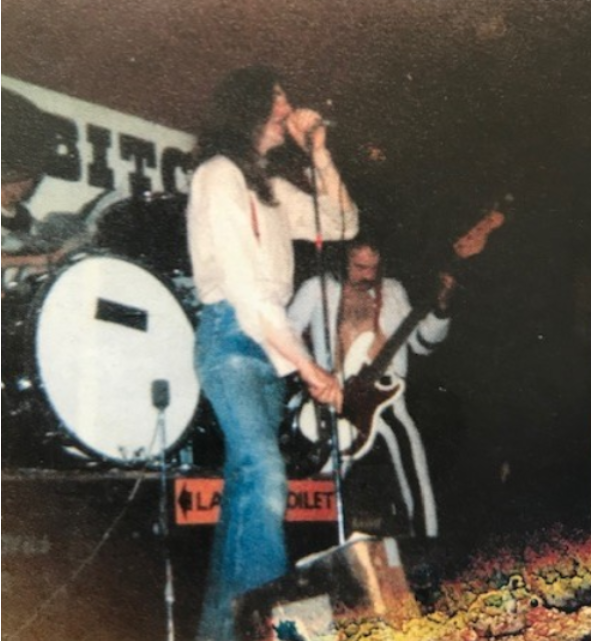
SOAB 1977, November 02: Bogart’s, Birmingham England
Source: Punk Music Catalogue
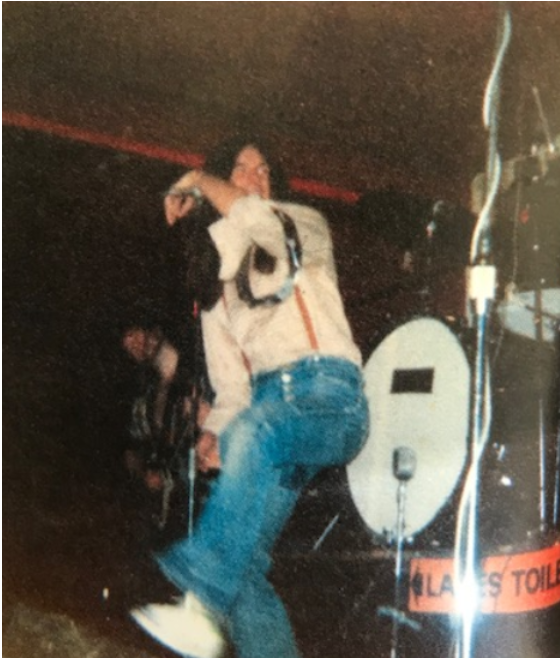
Venue
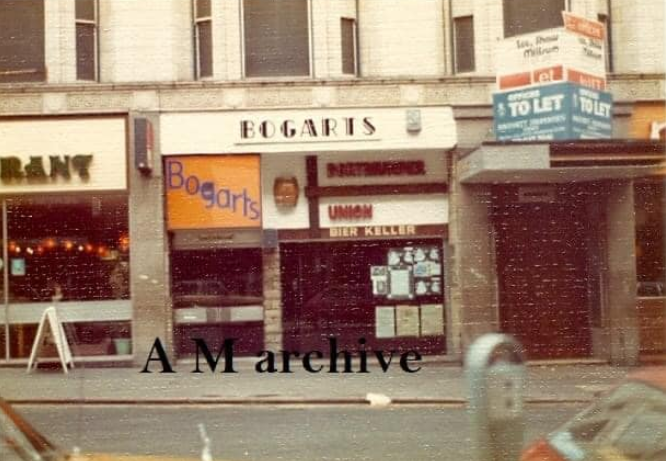
SOAB 1977, December 7: Boilermaker Social Club, Sunderland
Source Brian Potts
SOAB 1977, Dec 9: Rock Garden – Newport Road, Middlesbrough, England UK
Set list
Unknown, set list wanted
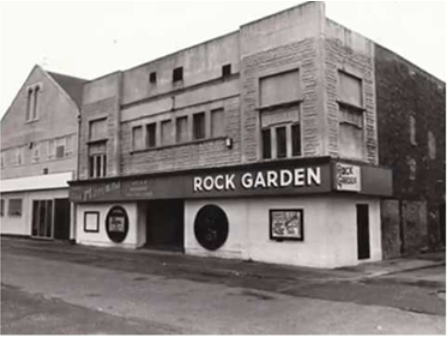
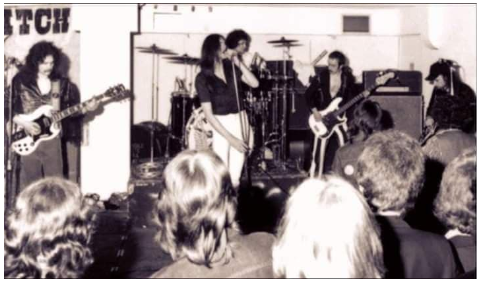
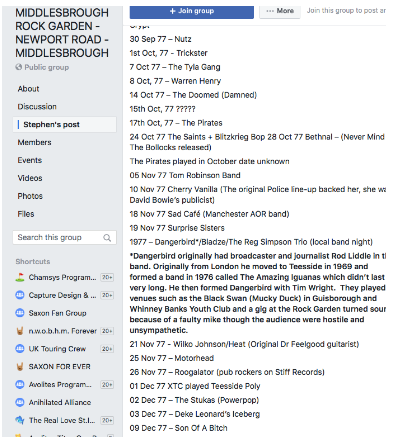
SOAB, 1977, Dec 12: Chester, Quaintways, England
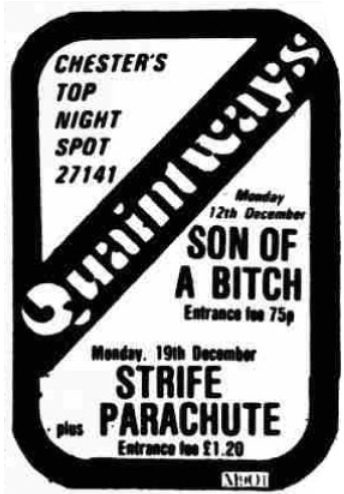
Venue
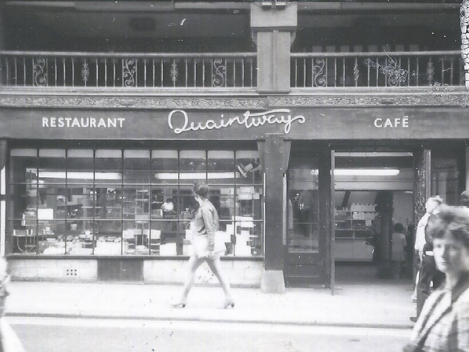
SOAB, 1977, Dec 15: Annabelle, Liverpool
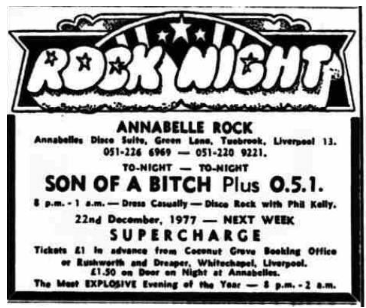
Venue
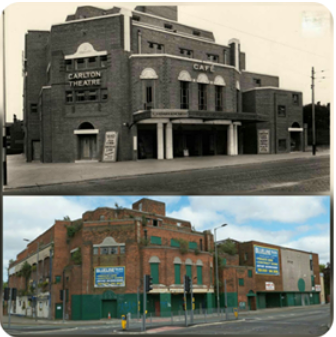
SOB, 1978, Jan 8: Maxims, Barrow in Furness, England UK
Set list
Unknown, set list wanted
Venue
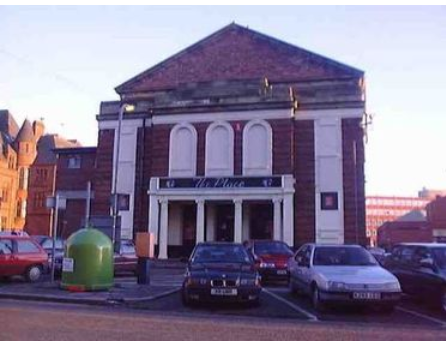
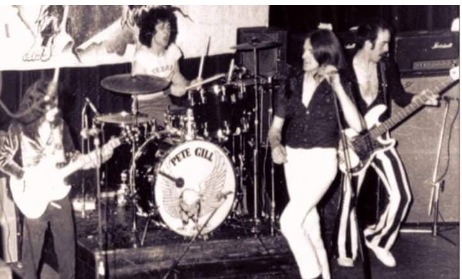
SOAB, 1978, Januari 14: Fforde Green Hotel, Leeds

Venue

SOAB 1978, January 18: Yarborough Club, Doncaster
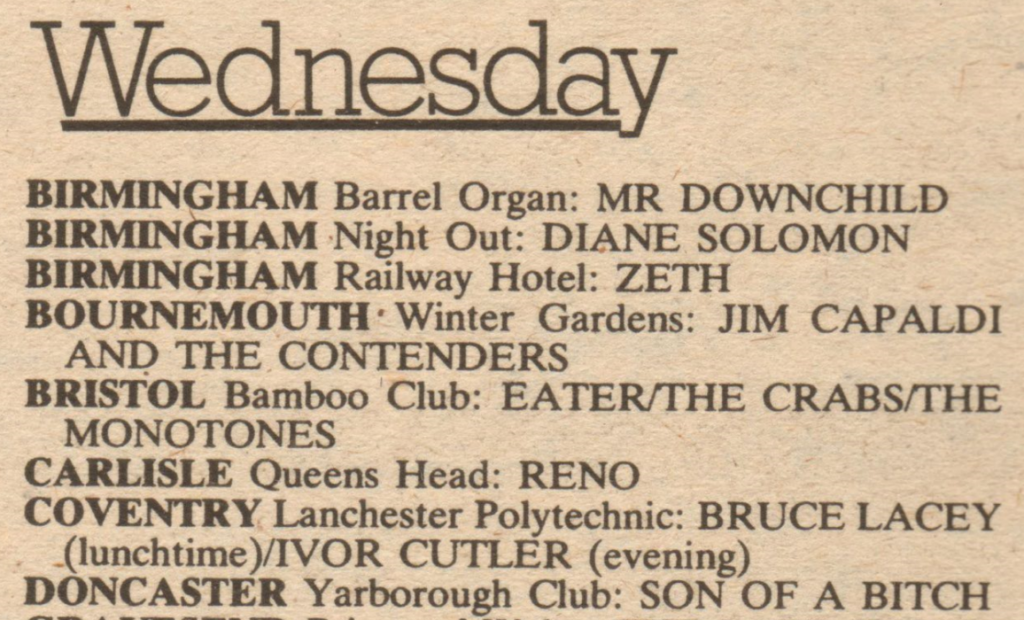
Venue
Picture wanted
SOAB 1978, January 19: Huntingdon, Stanley, England
Venue
Picture wanted
SOAB 1978, January 20: Boilermaker Social Club, Sunderland
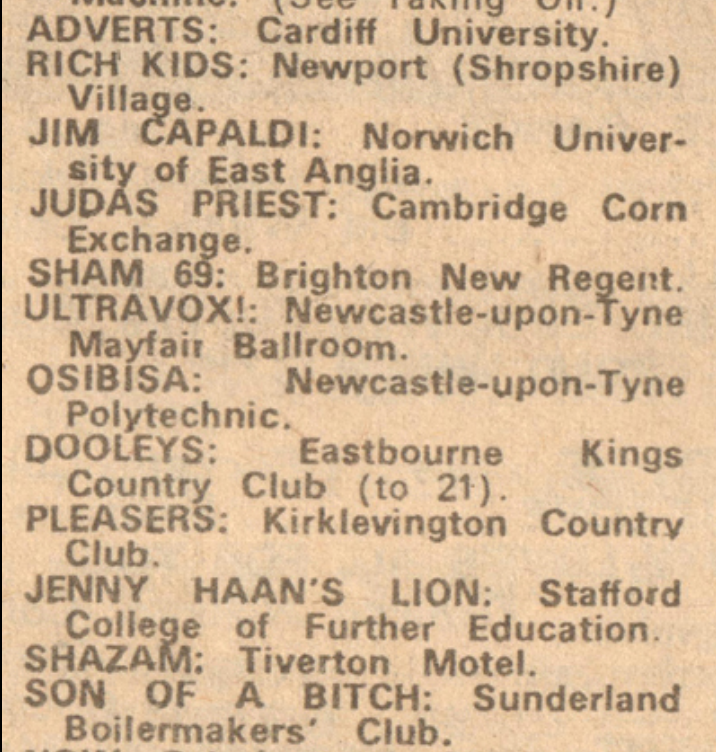
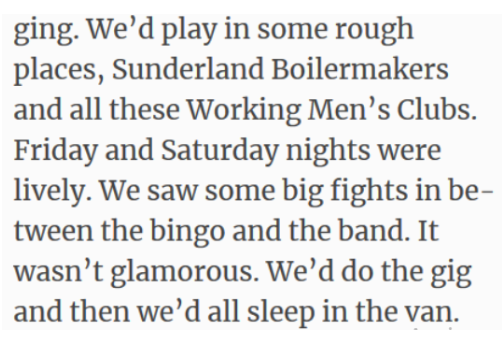

Venue
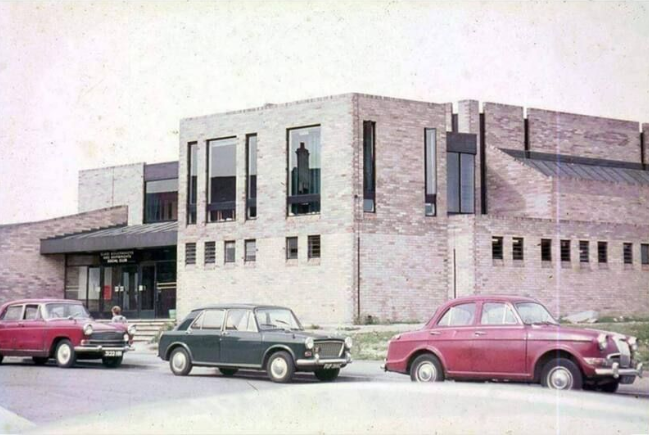
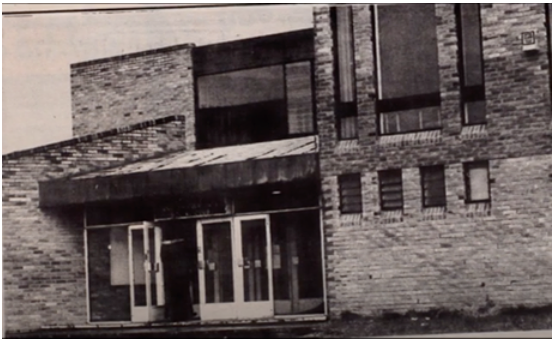
Below pictures used to called the ‘Boilermakers Arms’ before changing it’s name to Old 29 many years ago.
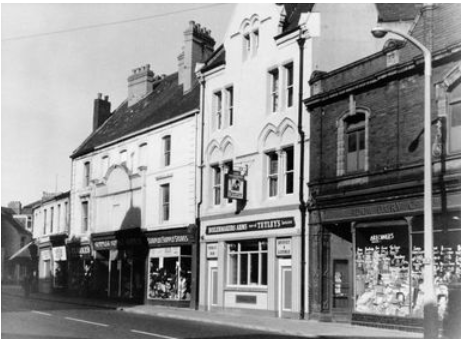
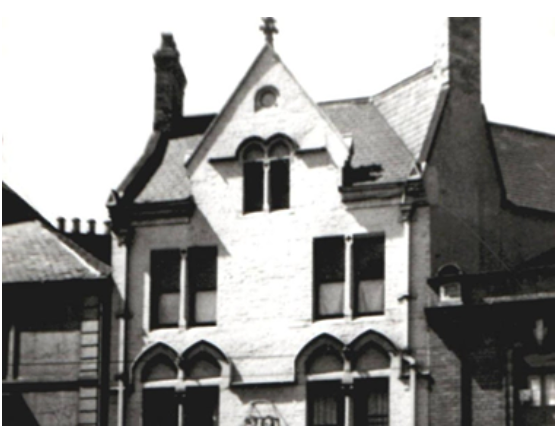
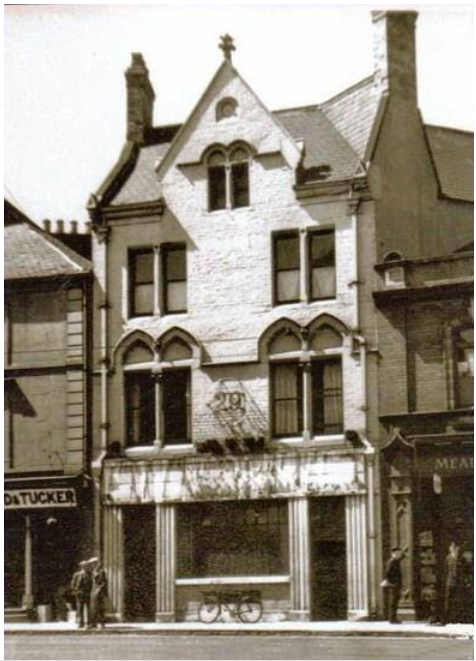
Set list (with kind permission of Brian Potts)
1st Set
– Stallions Of The Highway
– Judgement Day
– Frozen Rainbow
– Big Teaser
– Taking In The Dollar (Drum Solo)
– Anne Marie (SOB song)
– Freeway (SOB song)
2nd Set
– Lift Up Your Eyes (COAST song)
– Still Fit To Boogie
– Lazy Days (COAST song)
– Johnny B Goode
– Bop Shoo Wap
– Backs To The Wall
– Street Fighting Gang
– Easy (SOB song)
– Glad To Be Alive.
Encore
Frozen Rainbow ( This was a new song at the time )
Recordings (with kind permission of Brian Potts)
Add video
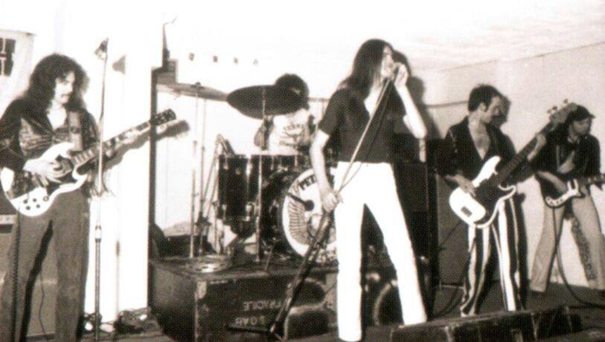
SOAB 1978, Januari 22: Patons Beehive, Darlington England
Source: Punk Music Catalogue
SOAB 1978, Januari 25: Bogart’s, Birmingham England
Source: Punk Music Catalogue

SOAB 1978, January 26: Non Political Club, Treforest Wales (see SCAN)

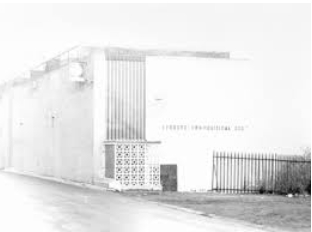
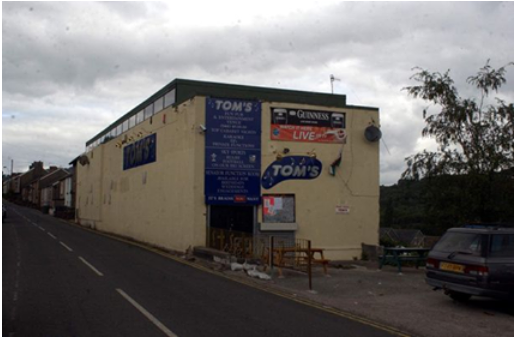
SOAB 1978, January 27: Ex Serviceman’s Club, Bargoed (see SCAN!)

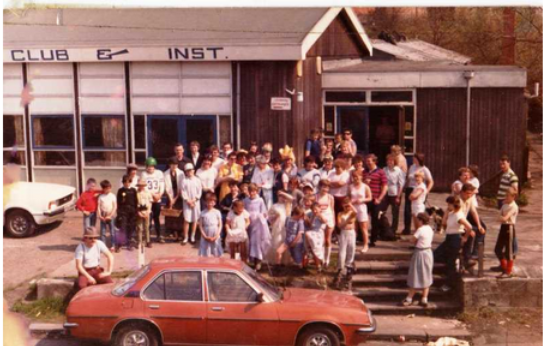
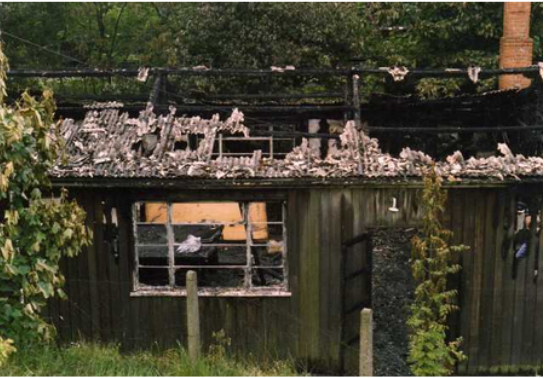
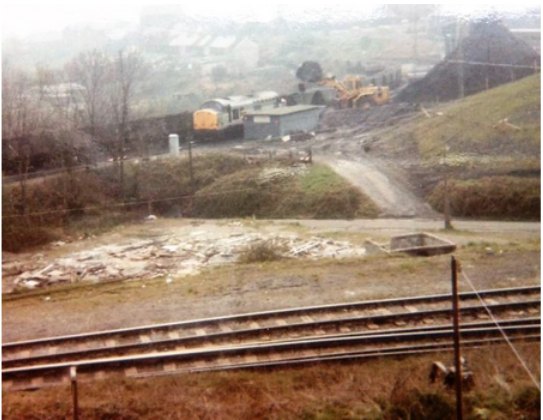
SOAB 1978, January 28: Six Bells, Abertillery (see SCAN!)

SOAB 1978, Februari 04: Rock Garden, Middlesbrough England
Source: Punk Music Catalogue

SOAB 1978, February 11: The Granary, Bristol



SOAB 1978, February 12: Bank Hall Miners Club, Burnley
The history of coal mining in Burnley can be dated to the 12/13th century but it was not until the 19th century that it became industrialised. The first Bank Hall Pit shaft was sunk in 1865 on behalf of the Hargreaves family and when the pit opened in 1869 it was, and remained, Burnleys largest and deepest shaft. It survived until 1971.
Thanks to the Coal Industry Welfare Organisation, and the men of Bank Hall who subscribed weekly, the project for a club got off the ground in 1954, when a committee was set up. The sports ground opened in 1956 and the club in 1957. There was a main ballroom, rear clubroom, small bar lounge and spacious games room, including provision for darts and snooker, as well as the committee room and usual offices. In the second half of the 1960s a ladies powder room was added, a feature which became increasingly desirable as the emphasis grew towards a family entertainment centre. The committees aim was to keep membership around 1,000. In 1970 there were 800 miner members and 150 associated members. In addition to the usual club facilities, there was a cabaret night on Saturdays, Group sessions on Tuesdays and Sundays and 50-50 dance nights each Friday.

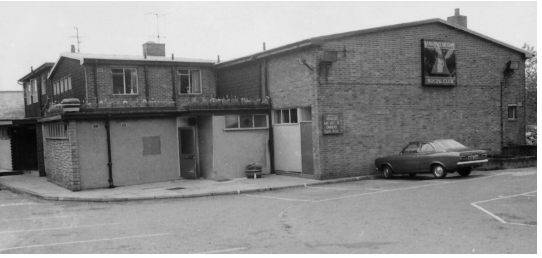
There was a main ballroom, rear clubroom, small bar lounge and spacious games room, including provision for darts and snooker, as well as the committee room and usual offices.
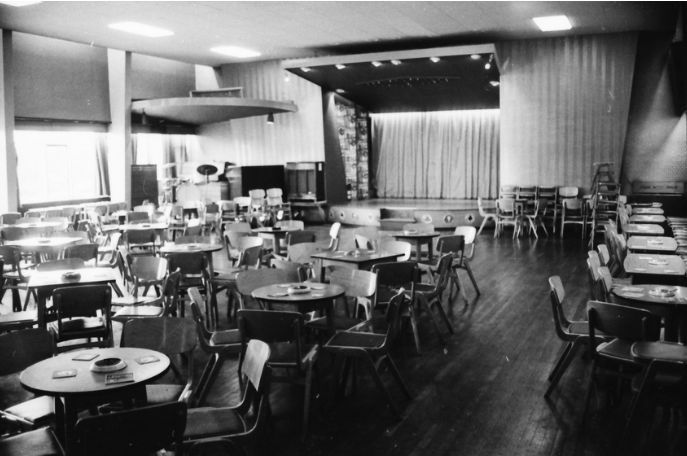
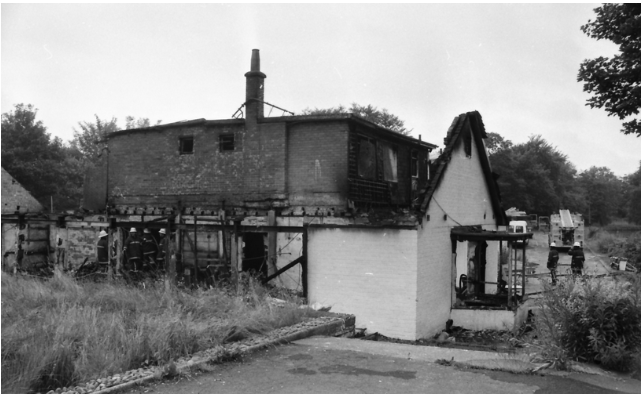
SOAB 1978, February 14: The Broadway, Morecambe

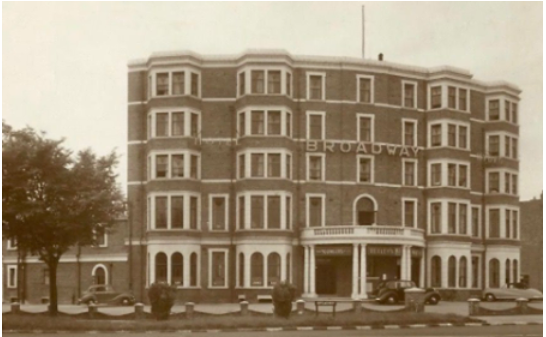
SOAB 1978, February 24: Mecca, Sunderland

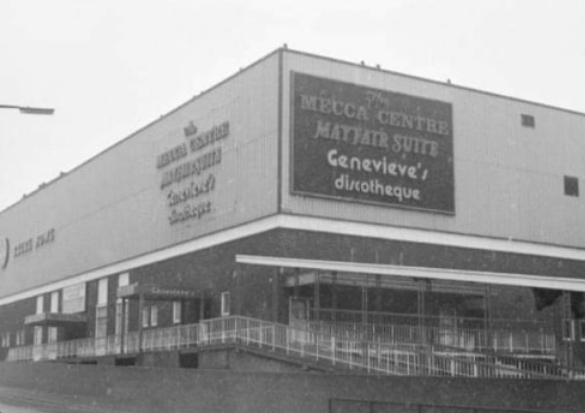
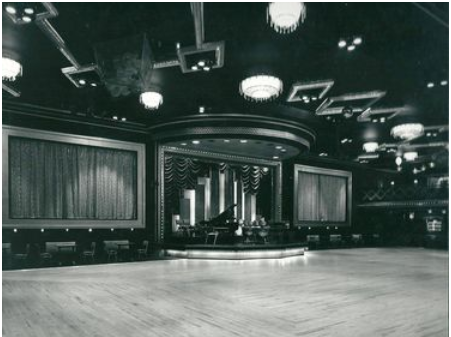
SOAB 1978, March 12: Jenkinson’s Bar, Blackpool

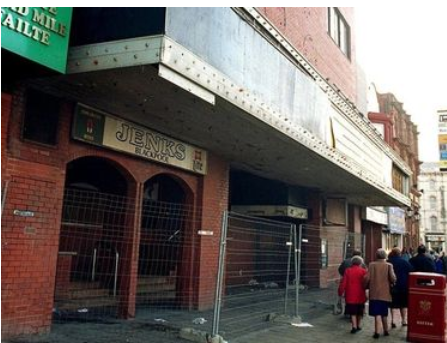
SOAB 1978, March 16: Rovers Quoits Club, Hartlepool

The original Rovers Quoits Club, Hartlepool was demolished in 2007. Not able to find any photos (only of the new club)
SOAB 1978, March 17: Village Club, Easington

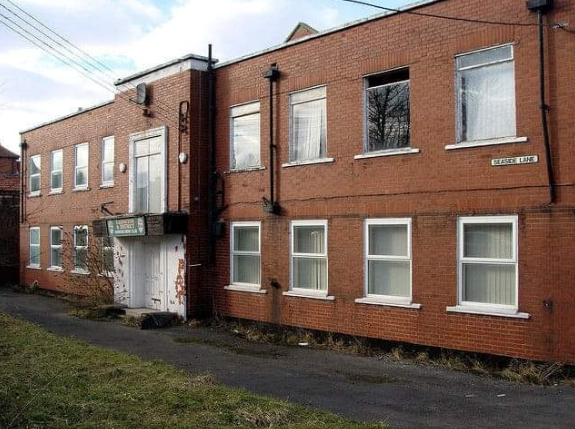
Source picture: David Mawhinney with kind permission (Sadly, now demolished)

SOAB 1978, March 19: Labour Club, Newcastle

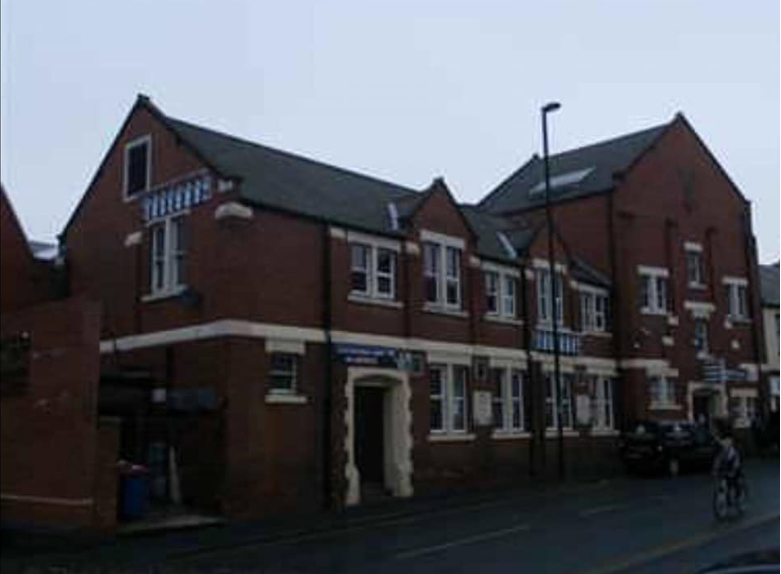
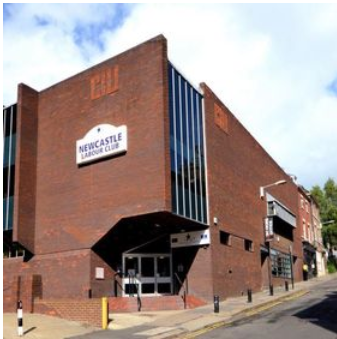
Labour Club, Newcastle (They didn’t play this vernue, but at the picture above)
SOAB 1978, March 20: The Club, Thornley

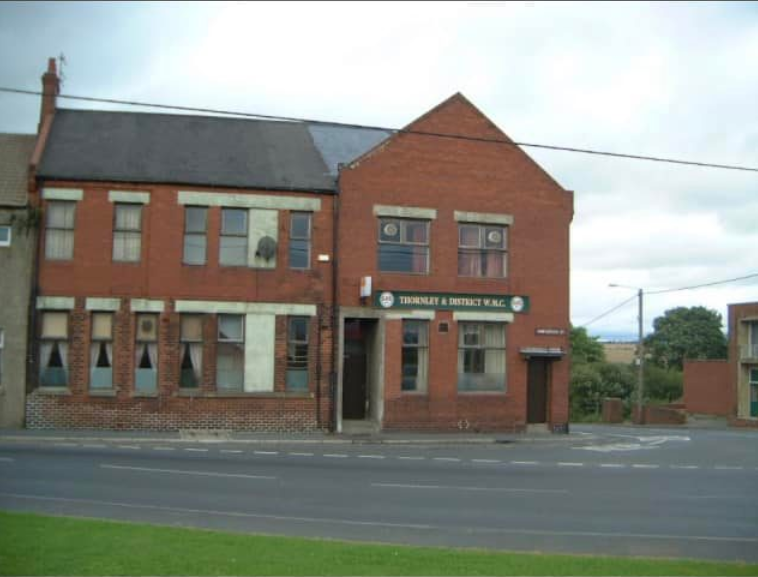
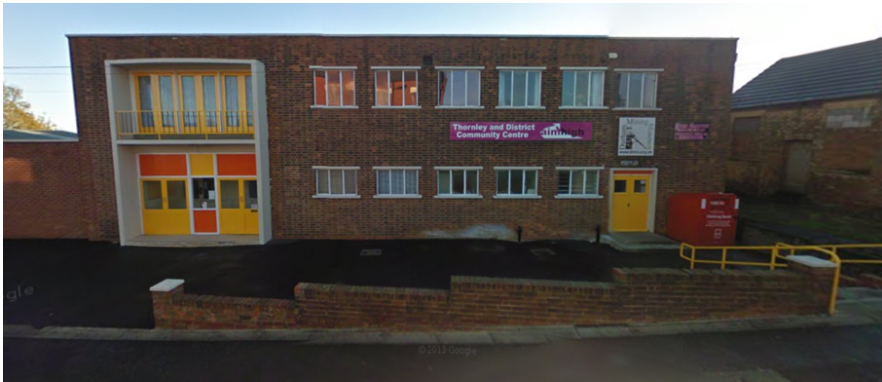
SOAB 1978, March 24: Boilermaker Social Club, Sunderland
Source Brian Potts
SOAB 1978, March 27: , Rose Hayworth Club, Abertillery

Picture of the Venue wanted
On Saturday 27th October 1962, The Rose Heyworth Tenants Community Hall was official opened. In 2008, it was closed and was demolished a year later.
SOAB 1978, March 29: Bogarts, Birmingham

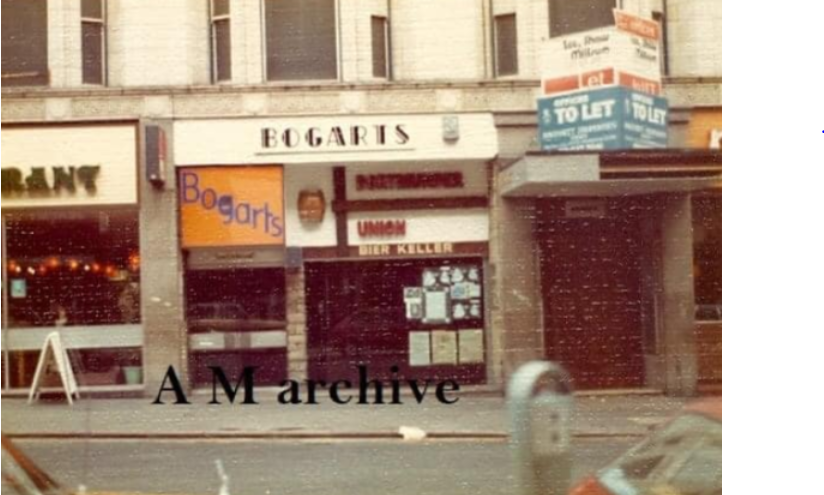
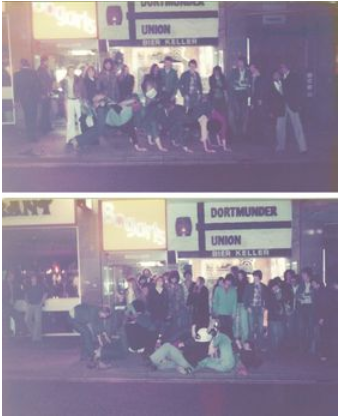

SOAB 1978, April 26: Four Winds, Port Talbot

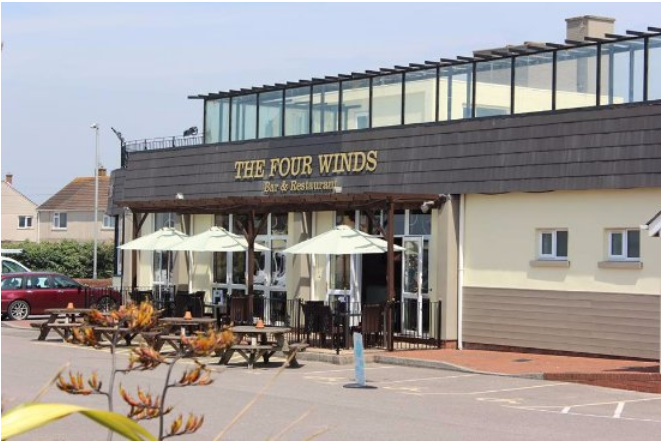
SOAB 1978, April 27: Non Political Club, Treforest


SOAB 1978, April 27: F Club (Roots), Leeds England ?? Double date
Source: Punk Music Catalogue
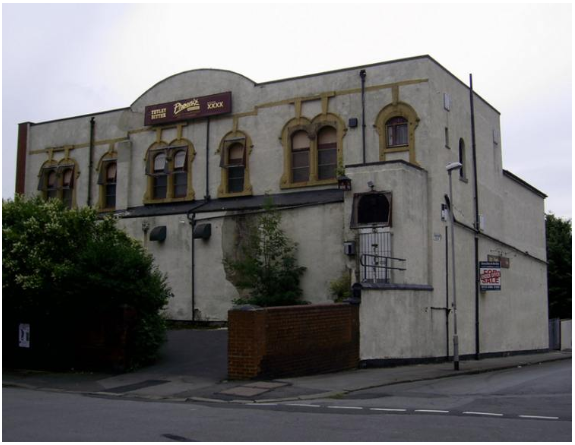
SOAB 1978, April 29: Royal Naval Club, Tonypandy

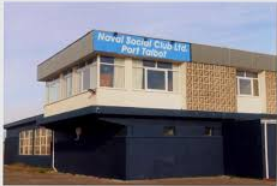
SOAB, 1978, Apr 30: Maxims, Barrow in Furness, England UK
Set list
Unknown, set list wanted
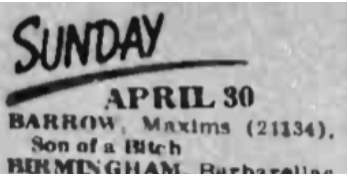


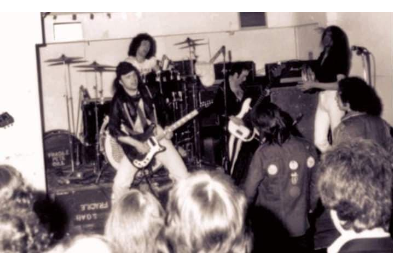
SOAB 1978, May 1, New Talk of Yorkshire Club, Bradford

SOAB 1978, May 2: Guildford Hotel Leeds

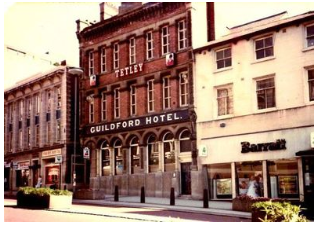
SOAB 1978, May 6: Fforde Green Hotel, Leeds


SOAB 1978, May 11: The Broadway, Morecambe


SOAB 1978, May 12: Penny Farthing, Ulverston

SOAB 1978, May 13: Civic Hall, Barnsley, England UK
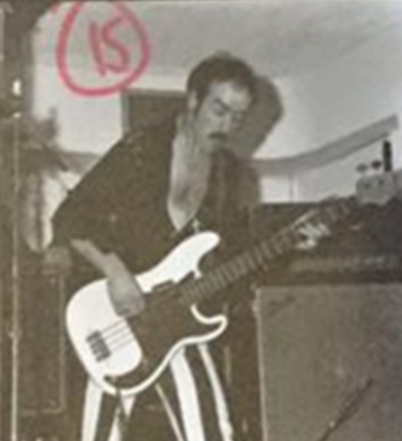
SOAB 1978, May 20: Lees Club, Sunderland
Source Brian Potts
SOAB 1978, May 22: Thornley Club, Thornley

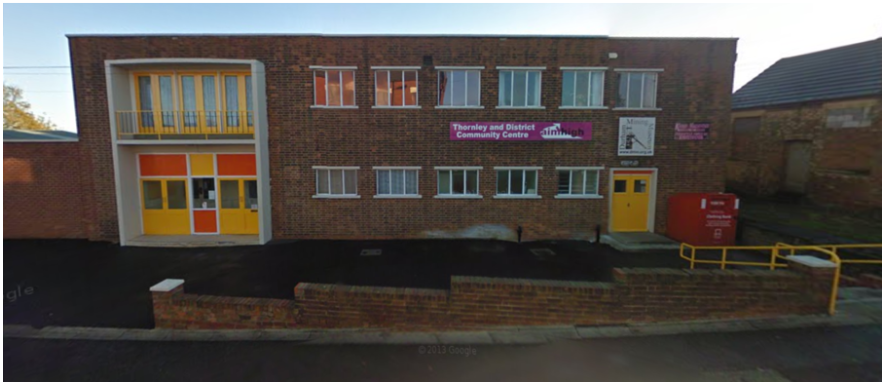
SOAB 1978, May 24: Boilermaker Social Club, Sunderland
Source Brian Potts
SOAB 1978, May 25: United Club, West Cornforth England
Source: Punk Music Catalogue


SOAB 1978, May 26: Village Club, Easington England
Source: Punk Music Catalogue
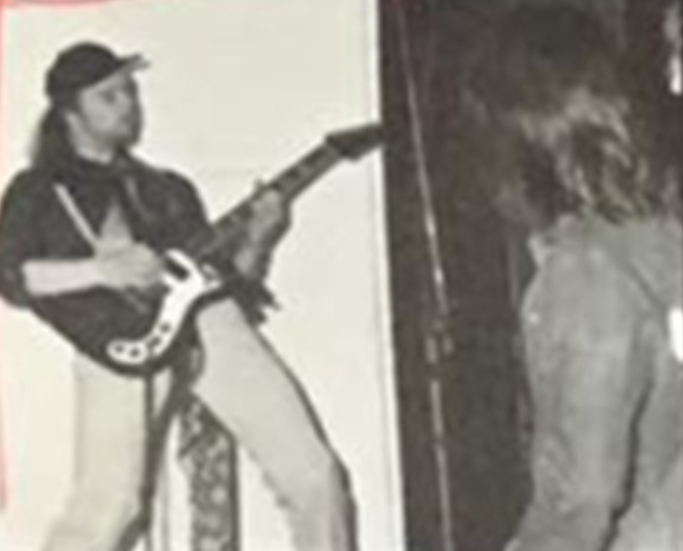
SOAB 1978, May 27: Rock Garden, Middlesborough
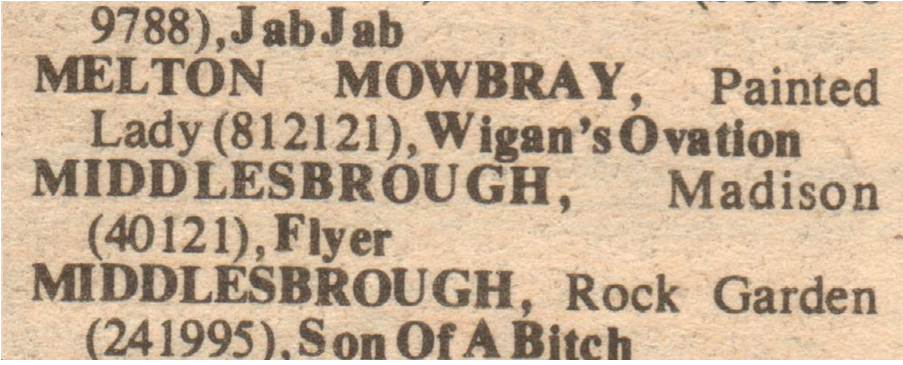

SOAB 1978, June 1: Princeville, Bradfort

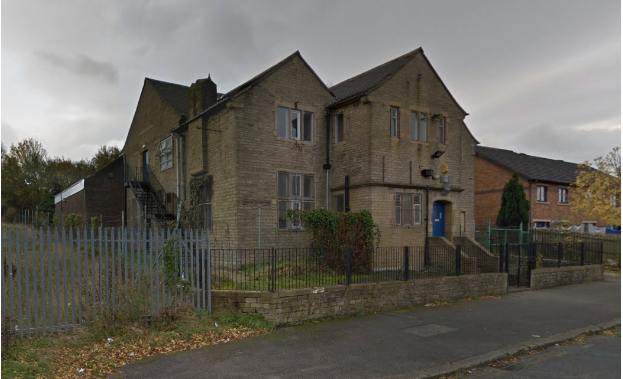
SOAB 1978, June 2: Bankhall, Burnley

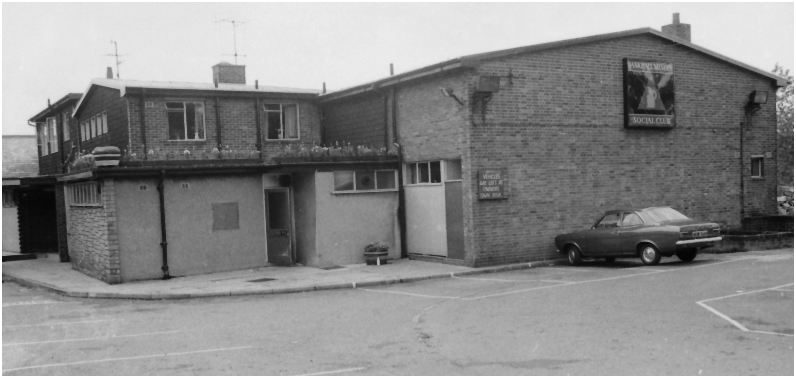
SOAB 1978, June 8: Dixieland Showbar, Colwyn Bay

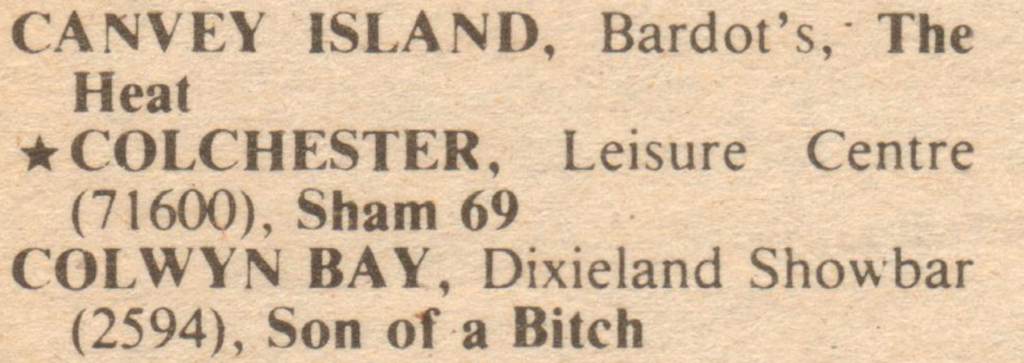

Concert review

SOAB 1978, June 9: City Tavern, Chelmsford

SOAB 1978, June 15: Dixieland, Colwyn Bay England
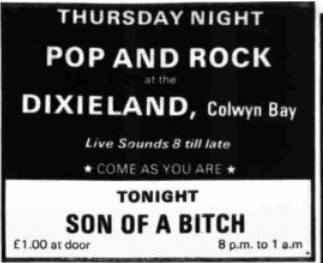

SOAB 1978, June 16: Village Club, Easington

SOAB 1978, June 21: Toppers, Norwich
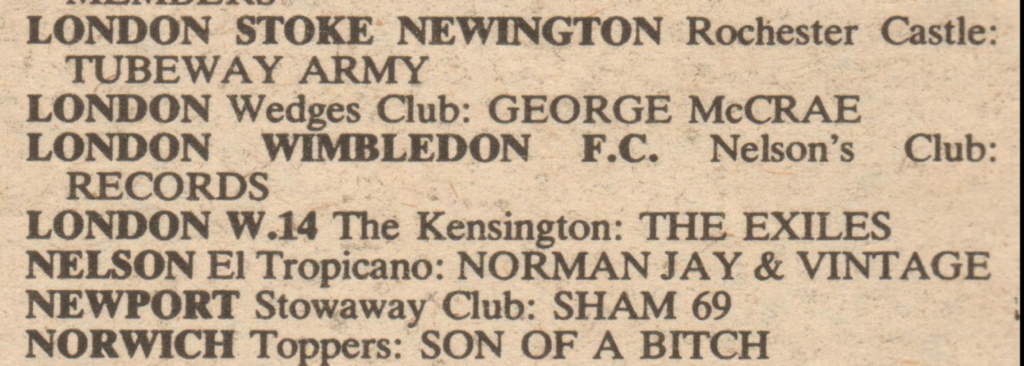
SOAB 1978, June 23: Sheffield University England
Source: Punk Music Catalogue
SOAB 1978, Jun 29: Troubador, Port Talbot, England

SOAB 1978, Jul 5: The Sportsman, Liverpool England
Set list
Unknown, set list wanted

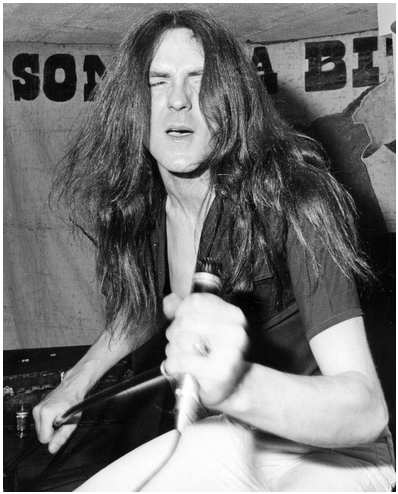
SOAB, 1978 July 17: West Cornforth Club ( nicknamed Doggy Club)
They changed their name at a meeting with Fred Cannon at the Newcastle station hotel after they did a gig in a nearby club nickname ‘Doggy Club’, it was about 3 am at the hotel when it was decided Saxon.
I signed Saxon on July 17th 1978. I was so excited that Pete Hinton and Noel Kaye brought me both SAXON and Iron maiden. SAXON opposed me signing Iron Maiden, who months later went to EMI. We had the best SAXON albums at CARRERE, thanks to a great team lead by Pete Hinton (Source Fred Cannon).
SOAB 1978, July 19: Boilermaker Social Club, Sunderland
Source Brian Potts
SOAB 1978, July 27: Club, Thornley England
Source: Punk Music Catalogue
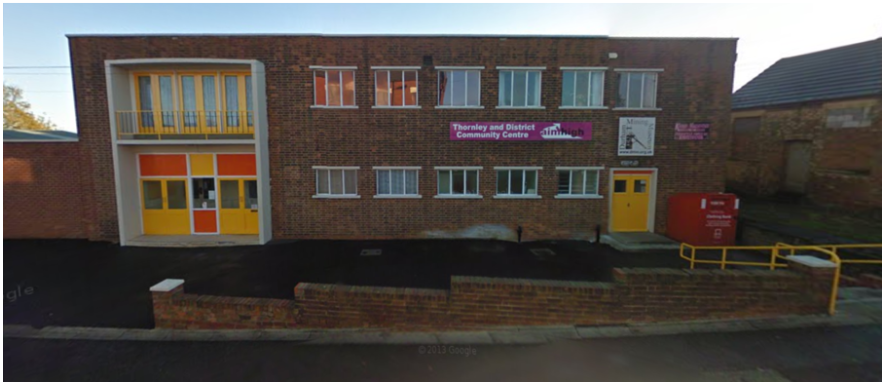
SOAB, 1978, Aug 11: Mayfair Ballroom, Newcastle England UK

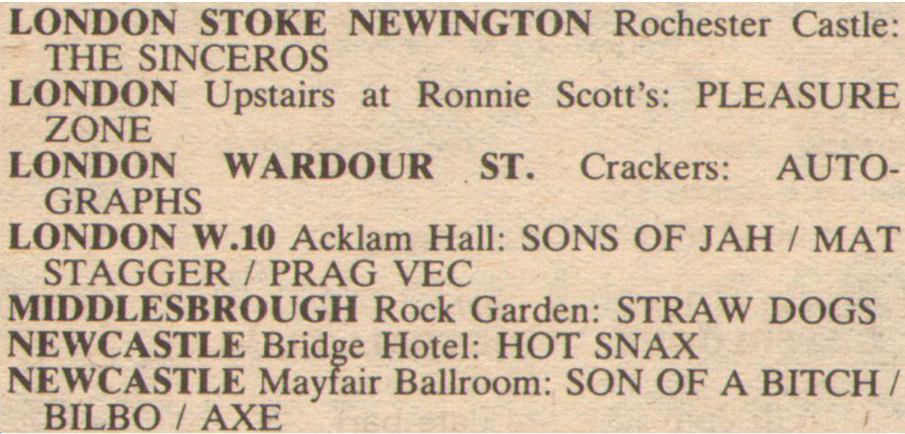
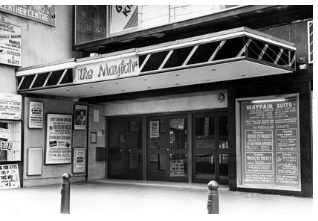
Set list
Unknown, set list wanted
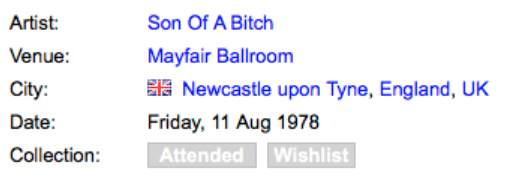
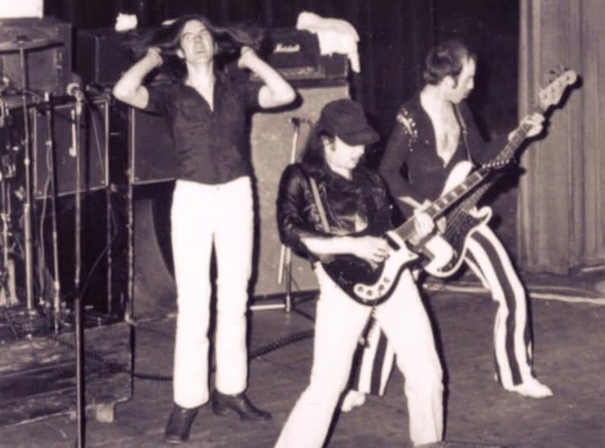
News Article sept 1978

SOAB 1978, November 19: Boilermaker Social Club, Sunderland
Source Brian Potts
SOAB, 1978 Dec 11: The Civic Barnsley, England UK
Set list
Unknown, set list wanted
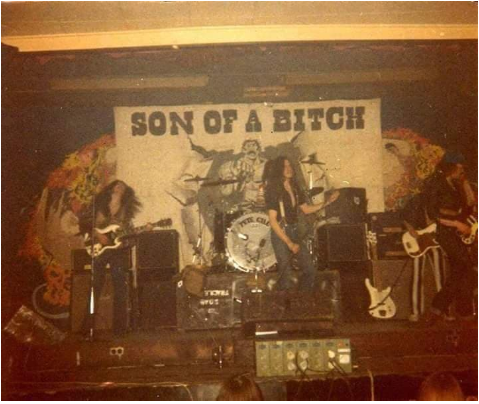




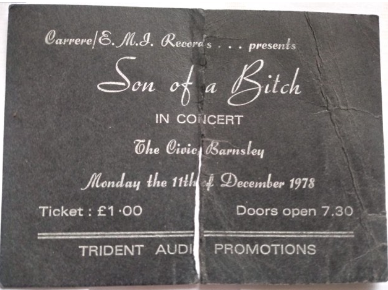
SOAB 1978, December 17: Fforde Grene, Leeds England
Source: Punk Music Catalogue

SOAB 1979, May 19: Special thank you concert for local fans at Civic Hall, Barnsley, England UK
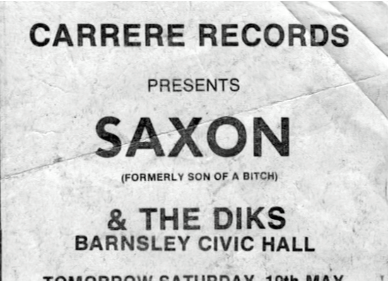
*** B: Concerts without exact dates but with known venues (1976 – 1978) ***
Greyhound, Fulham, London, England
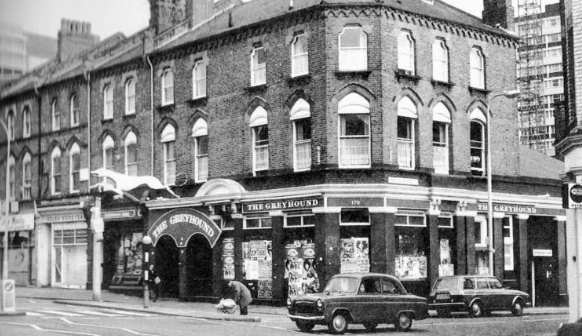
Alhambra Hotel, Sheffield Road, Barnsley
SOAB played a couple of times at this venue

Belle Vue, Manchester
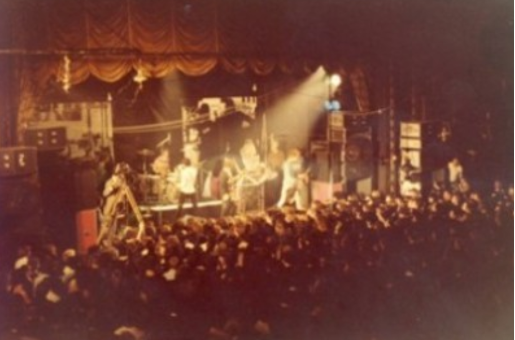

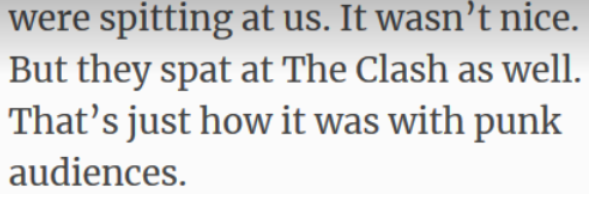
Could be May 8 1977, The Electric Circus, Manchester, ENG
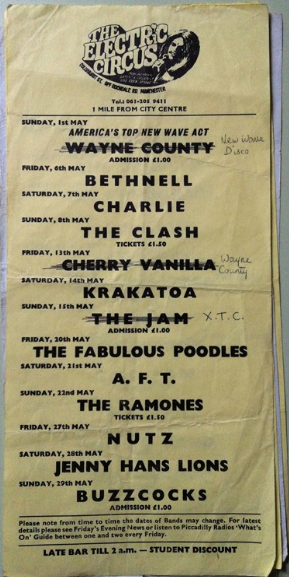
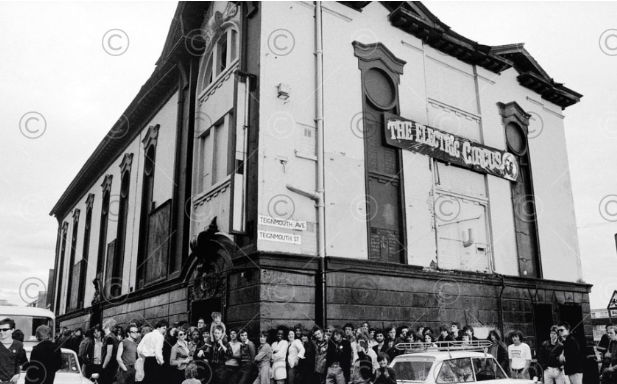
Could be November 15, 1977 Belle Vue, Manchester, ENG (with The Clash, Siouxsie & The Banshees)
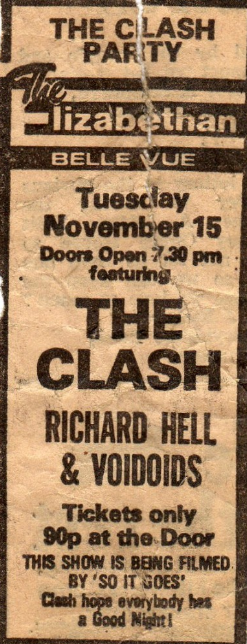
Phoenix, Manchester

1978, Jul 17: West Cornforth Club (nicknamed Doggy club)
They changed their name at a meeting with Fred Cannon at the Newcastle station hotel on July 17th 1978. They did a gig in a nearby club nickname ‘Doggy Club’, it was about 3 am at the hotel when it was decided Saxon
Ashington Cellar club
I’m sure the first time I saw them at Ashington cellar club they were a 3piece and the guitarist s@ng
Heaton Buffs, Newcastle upon Tyne, England

Middlesbrough Town hall


Thornaby Cons club
Used to watch them at Thornaby cons club . Thursday night was rock night
Spennymoor Working Mens Club

Shildon Working Mens Club
Is this the same venue as the Shildon Civic Hall
Eagle and Child pub, Conisburgh (1977)

Shildon Civic Hall



SOAB Demo’s
Early 1976 SOB Tapestry Sessions with Biff and Paul joined (After the name has changed from SOB to Son Of A Bitch)
Radio Luxemburg sessions in 1978
Unclassified recordings like Frozen Rainbow with Rod Argent on Keyboard
To add
Overview SOAB concerts
| Date | Venue | City | |
| 22-11-1975 | COAST joined SOB | ||
| 25-12-1975 | Dickens lnn | Rotherham | First session jammed around Christmas |
| 6-2-1976 | Small Civic venue | Barnsley | First SOAB concert |
| 5-3-1976 | Small Civic venue | Barnsley | |
| 13-5-1976 | The Nashville Rooms | London | |
| 23-5-1976 | Boat Club | Nottingham | |
| 4-6-1976 | Civic Hall | Barnsley | |
| 11-7-1976 | Boat Club | Nottingham | |
| 17-7-1976 | Civic Hall | Barnsley | |
| 3-9-1976 | George Hotel | Alfreton | |
| 6-10-1976 | Early october, Graham accident | ||
| Melodymaker | Mid november, search for new drummer | ||
| 20-11-1976 | Civic Hall | Barnsley | |
| 1-12-1976 | Adam & Eve | Chesterfield | Probably last concert of John Walker |
| Januari, start Pete Gill | |||
| 11-8-1977 | Princeville Club | Bradford | |
| 14-8-1977 | Fforde Grene Hotel | Leeds | |
| 11-9-1977 | Top rank | Sheffield | |
| 16-9-1977 | Top Rank Suite | Cardiff | |
| 17-9-1977 | Pawlett Manor Hotel | Bridgewater | |
| 6-10-1977 | Granary | Bristol | |
| 7-10-1977 | The Apollo | Manchester | Supporting Ian Gillan |
| 8-10-1977 | Arrail Street Club | Abertillery | Wales |
| 13-10-1977 | Dixieland Showbar | Southport | |
| 15-10-1977 | Belle Vue | Manchester | with The Clash |
| 28-10-1977 | The Centenary Rooms | Barnsley | |
| 2-11-1977 | Bogart’s | Birmingham | |
| 9-11-1977 | Rock Garden | Middlesbrough | |
| 12-12-1977 | Quaintways | Chester | |
| 15-12-1977 | Annabelle | Liverpool | |
| 8-1-1978 | Maxims | Barrow in Furness | |
| 14-1-1978 | Fforde Grene Hotel | Leeds | |
| 18-1-1978 | Yarborough Club | Doncaster | |
| 19-1-1978 | Stanley | Huntingdon | |
| 20-1-1978 | Boilermaker Club | Sunderland | |
| 22-1-1978 | Patons Beehive | Darlington | |
| 25-1-1978 | Bogart’s | Birmingham | |
| 26-1-1978 | Non Political Club | Treforest | Wales |
| 27-1-1978 | Ex Serviceman’s Club | Bargoed | Wales |
| 28-1-1978 | Six Bells | Abertillery | Wales |
| 4-2-1978 | Rock Garden | Middlesbrough | |
| 11-2-1978 | The Granary | Bristol | |
| 12-2-1978 | Miners Club | Bankhall | |
| 14-2-1978 | The Broadway | Morecambe | |
| 24-2-1978 | Mecca | Sunderland | |
| 12-3-1978 | Jenkinson’s Bar | Blackpool | |
| 16-3-1978 | Rovers Quoits Club | Hartlepool | |
| 17-3-1978 | Village Club | Easington | They played regularly at this club |
| 19-3-1978 | Labour Club | Newcastle | |
| 20-3-1978 | The Club | Thornley | |
| 27-3-1978 | Rose Hayworth Club | Abertillery | Wales |
| 29-3-1978 | Bogart’s | Birmingham | |
| 26-4-1978 | Four Winds | Port Talbot | |
| 27-4-1978 | Non Political Club | Treforest | Wales |
| 27-4-1978 | F Club (Roots) | Leeds | |
| 29-4-1978 | Royal Naval Club | Tonypandy | |
| 30-4-1978 | Maxims | Barrow in Furness | |
| 1-5-1978 | New Talk of Yorkshire Club | Bradford | |
| 2-5-1978 | Guildford Hotel | Leeds | |
| 6-5-1978 | Fforde Grene Hotel | Leeds | |
| 11-5-1978 | The Broadway | Morecambe | |
| 12-5-1978 | Penny Farthing | Ulverston | |
| 13-5-1978 | Civic Hall | Barnsley | |
| 22-5-1978 | Thornley Club | Thornley | |
| 25-5-1978 | United Club | West Cornforth | |
| 26-5-1978 | Village Club | Easington | |
| 27-5-1978 | Rock Garden | Middlesborough | |
| 1-6-1978 | Princeville | Bradford | |
| 2-6-1978 | Bankhall | Burnley | |
| 8-6-1978 | Dixieland Showbar | Colwyn Bay | |
| 9-6-1978 | City Tavern | Chelmsford | |
| 15-6-1978 | Dixieland | Colwyn Bay | |
| 16-6-1978 | Village Club | Easington | |
| 21-6-1978 | Toppers | Norwich | |
| 23-6-1978 | University | Sheffield | |
| 29-6-1978 | Troubador | Port Talbot | |
| 5-7-1978 | The Sportsman | Liverpool | |
| 17-7-1978 | Doggy Club | Newcastle | At nearby Station hotel, name change Saxon |
| 27-7-1978 | Thornley Club | Thornley | |
| 11-8-1978 | Mayfair Ballroom | Newcastle | |
| 11-12-1978 | Civic Hall | Barnsley | |
| 17-12-1978 | Fforde Grene Hotel | Leeds | |
| 19-12-1978 | Civic Hall | Barnsley | |
| Town hall | Middlesbrough | Unknown date | |
| Unknown | Newbiggin-by-the-Sea | Unknown date | |
| Cons Club | Thornaby | Unknown date | |
| Working Mens Club | New Shildon | Unknown date | |
| Working Mens Club | Spennymoor | Unknown date (1976) | |
| Cezanne’s | Altrincham | Unknown date (1976) | |
| Greyhound | Fulham | Unknown date (1976) | |
| Eagle and Child pub | Conisburgh | Unknown date (1977) | |
| Alhambra Hotel | Barnsley | Unknown date (1977) (Multiple times) | |
| Belle Vue | Manchester | Unknown date (1977) | |
| The Electric Circus | Manchester | Unknown date (1977) | |
| Phoenix | Manchester | Unknown date (1977) | |
| Civic Hall | Shildon | Unknown date (1978) | |
| Labour Club | Newcastle | Unknown date |

West Cornforth is known locally as Doggy. The social club is kown as Doggy Club. I saw SOB at New Shildon wmc and Spennymoor wmc more than once. I am sure that there were 2 bass players at one time at Spennymoor club. The commitee kept asking the band to turn it down. A friend of mine Raymond Timmins was friendly with the band and was asked to go on a USA tour with them (Saxon) supporting Rush I believe but he didn’t want to pack his job in
Thanks for your message, great info sure, It has been corrected on the site.
I knew John Walker (former SOB drummer) quite well, as he used to drink in The Blue Bell pub, Chesterfield in the ‘70’s. He was a really nice gentle kinda guy, we used to talk a lot about bands & what he & I were doing musically. I’d be about 17 1(976) and I first met him in a place called The Zone Club in Brimington, Chesterfield. It was a youth type community centre where rooms could be hired (building still exists). So whilst I was trying to pull a band together (High Horse) in a small upstairs room, I clearly recall John & S.O.B setting up their gear and rehearsing in the main room downstairs. This was probably not long before Johns departure from the SOB.
Not too long after, I met John in the pub (yes I was under-age drinking – weren’t we all !?) and he was sporting a broken collar bone. I recall he told me that he was out of the band (replaced whilst recovering) and that he’d sustained the injury after a gig whilst loading the band van. He was most upset about it! He said they were mucking around after the gig and they set off and he ran into the tailgate chasing after them. Of course I can’t really qualify any of this and John is sadly long gone and far too young. Nevertheless my memories of these days are good & I believe as accurate as I can be after 50yrs (aaargh!). I can only imagine that SOB were rehearsing in Brimington because of John’s location. Guess I’ll never know!
Wonderful story, thanks for sharing!! Maybe there are other things that you like to add to the site, i will fully credit you.